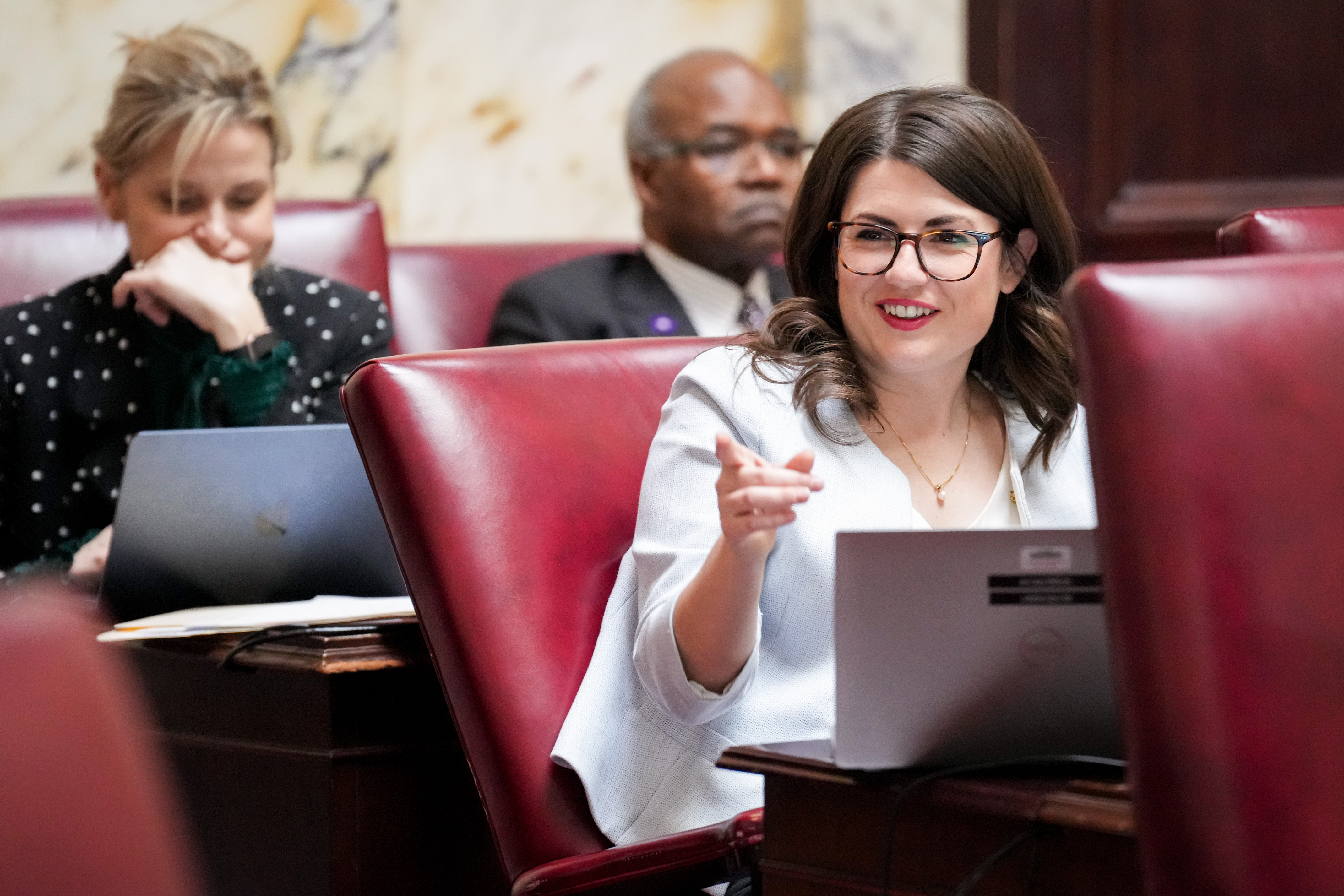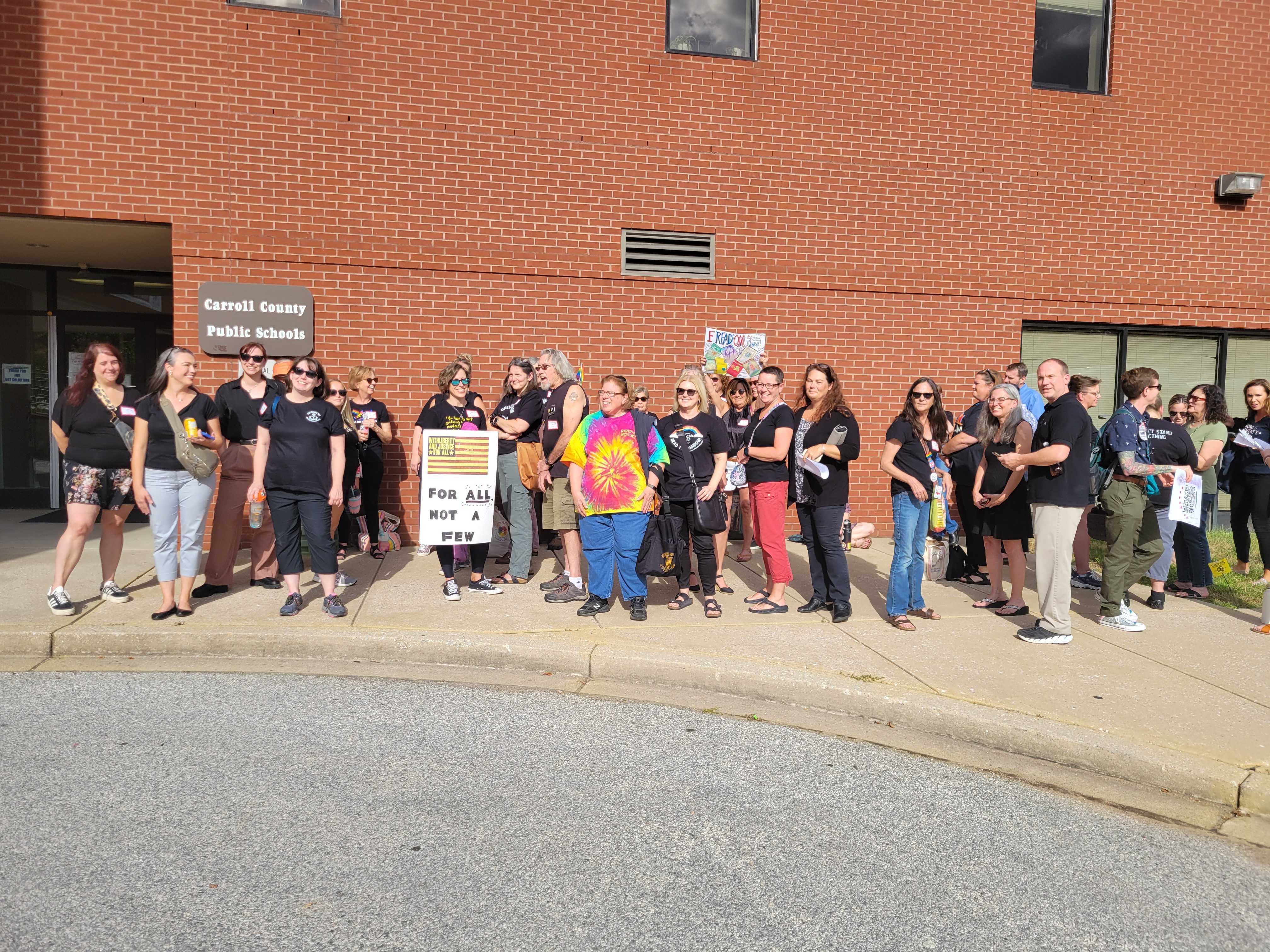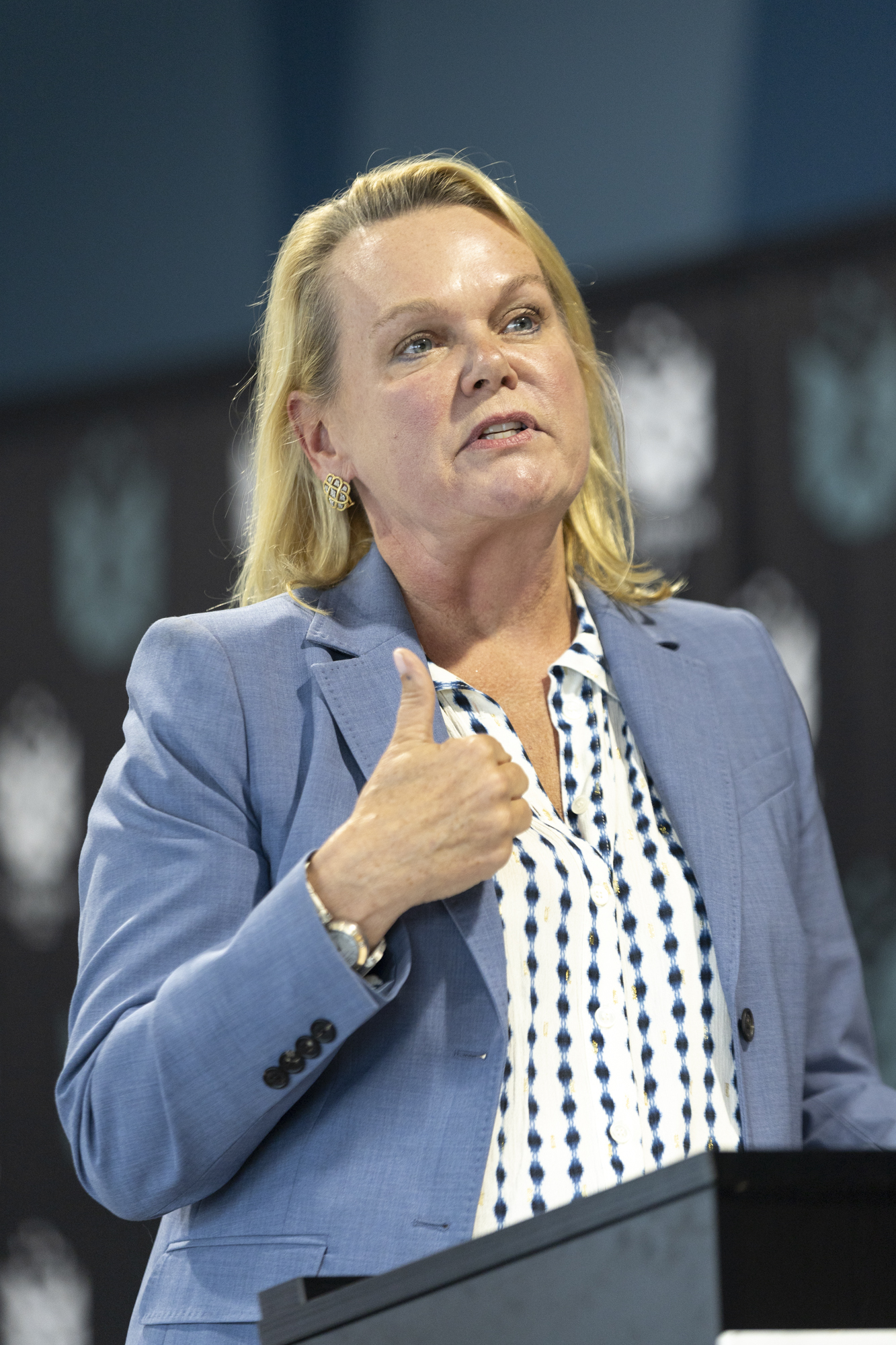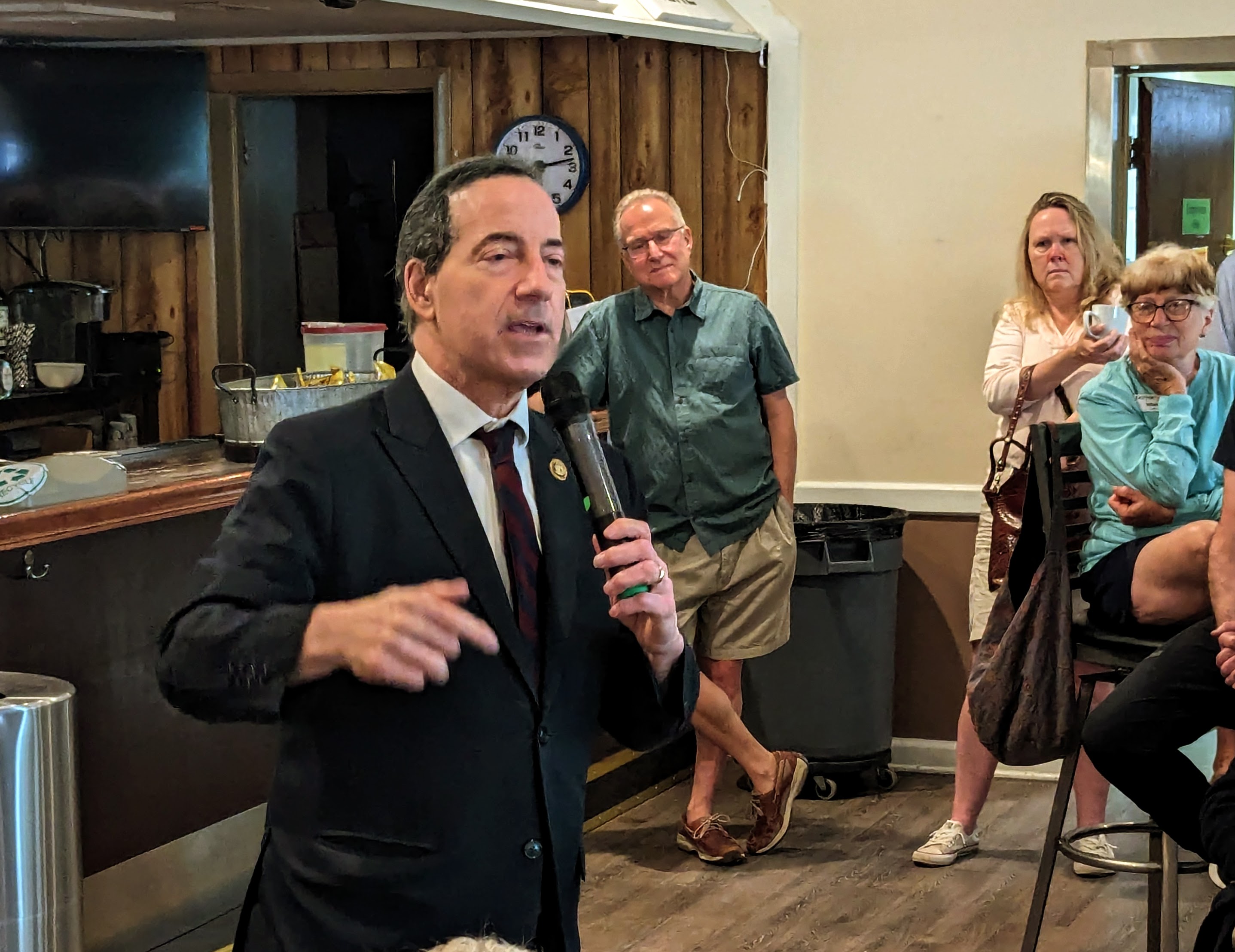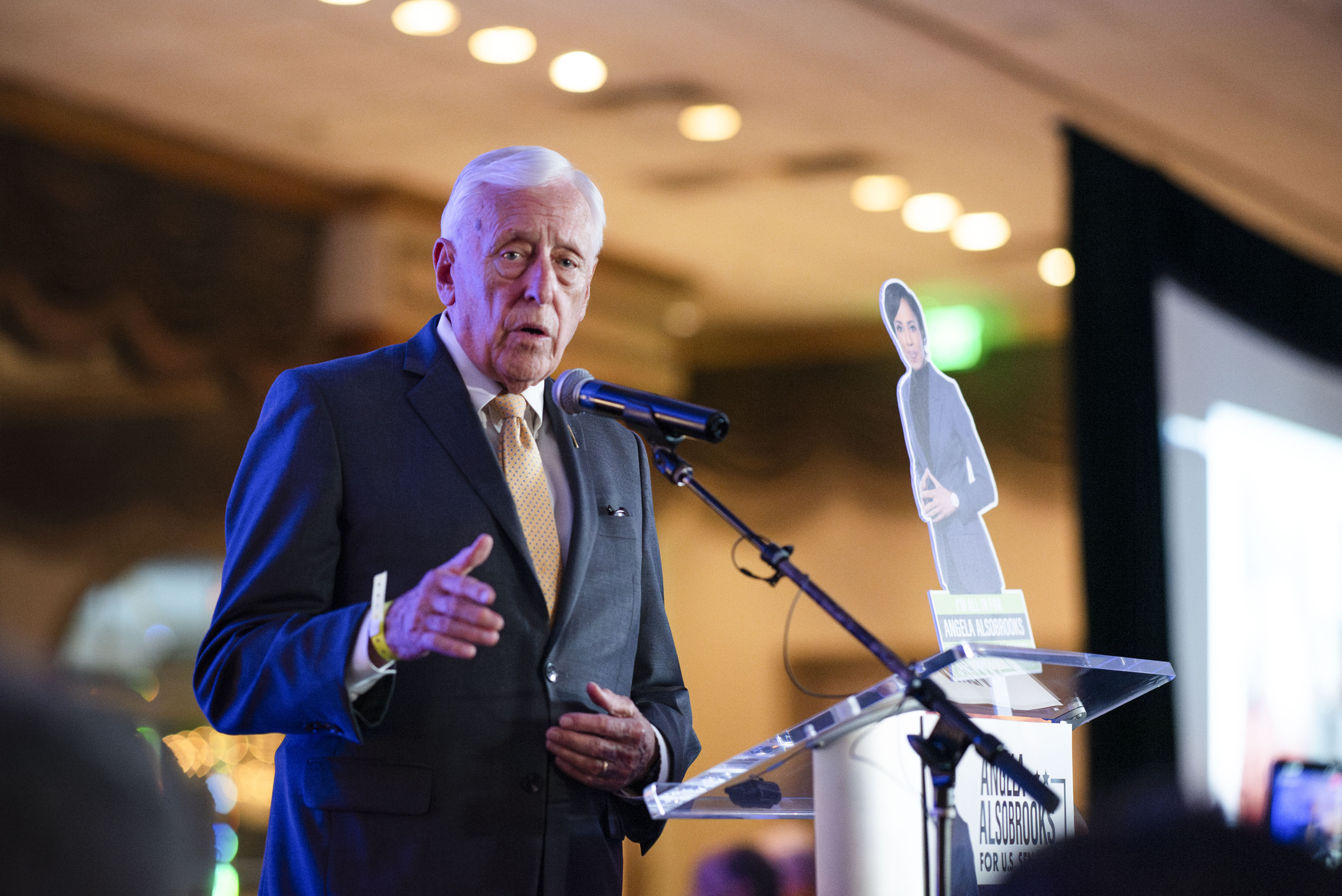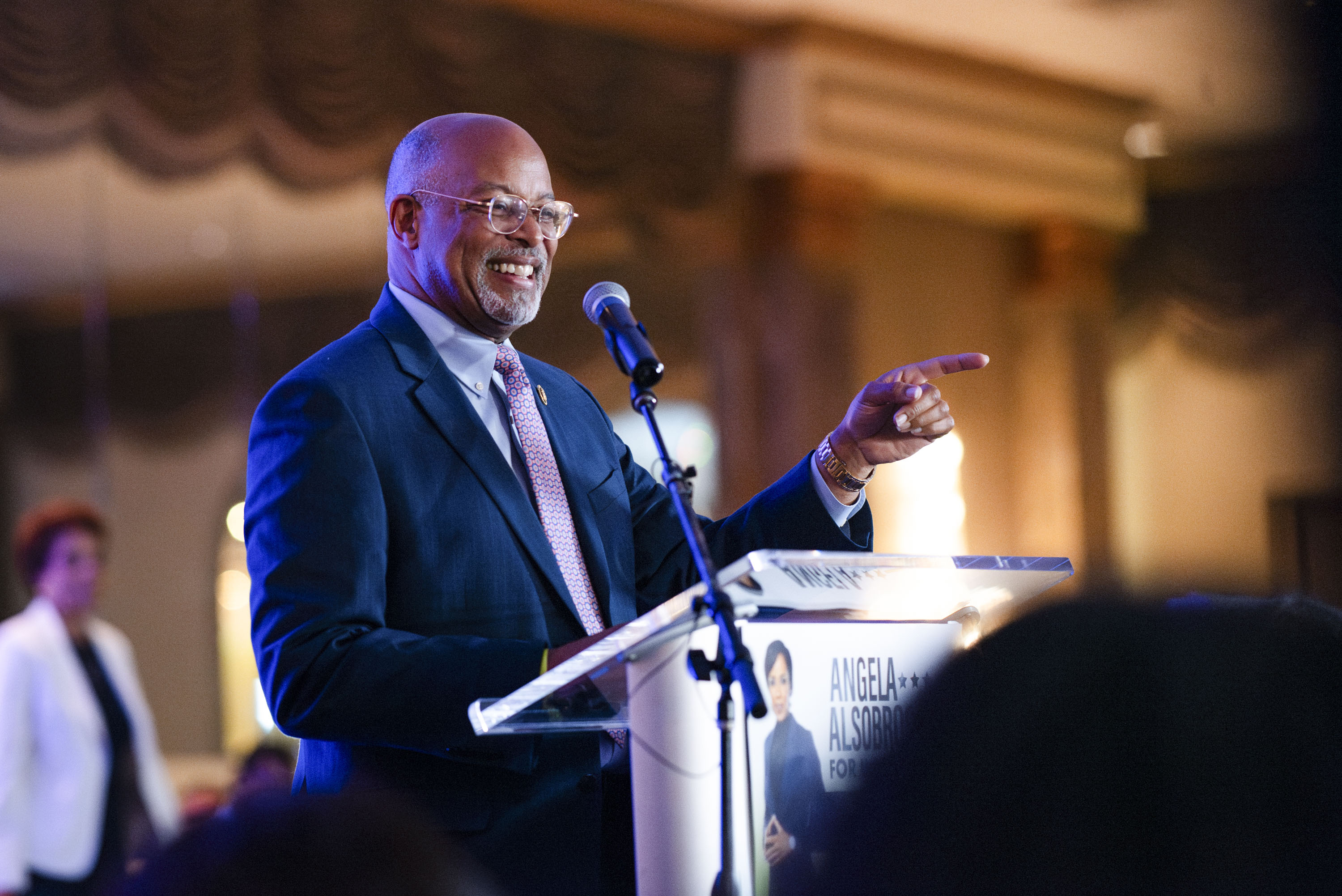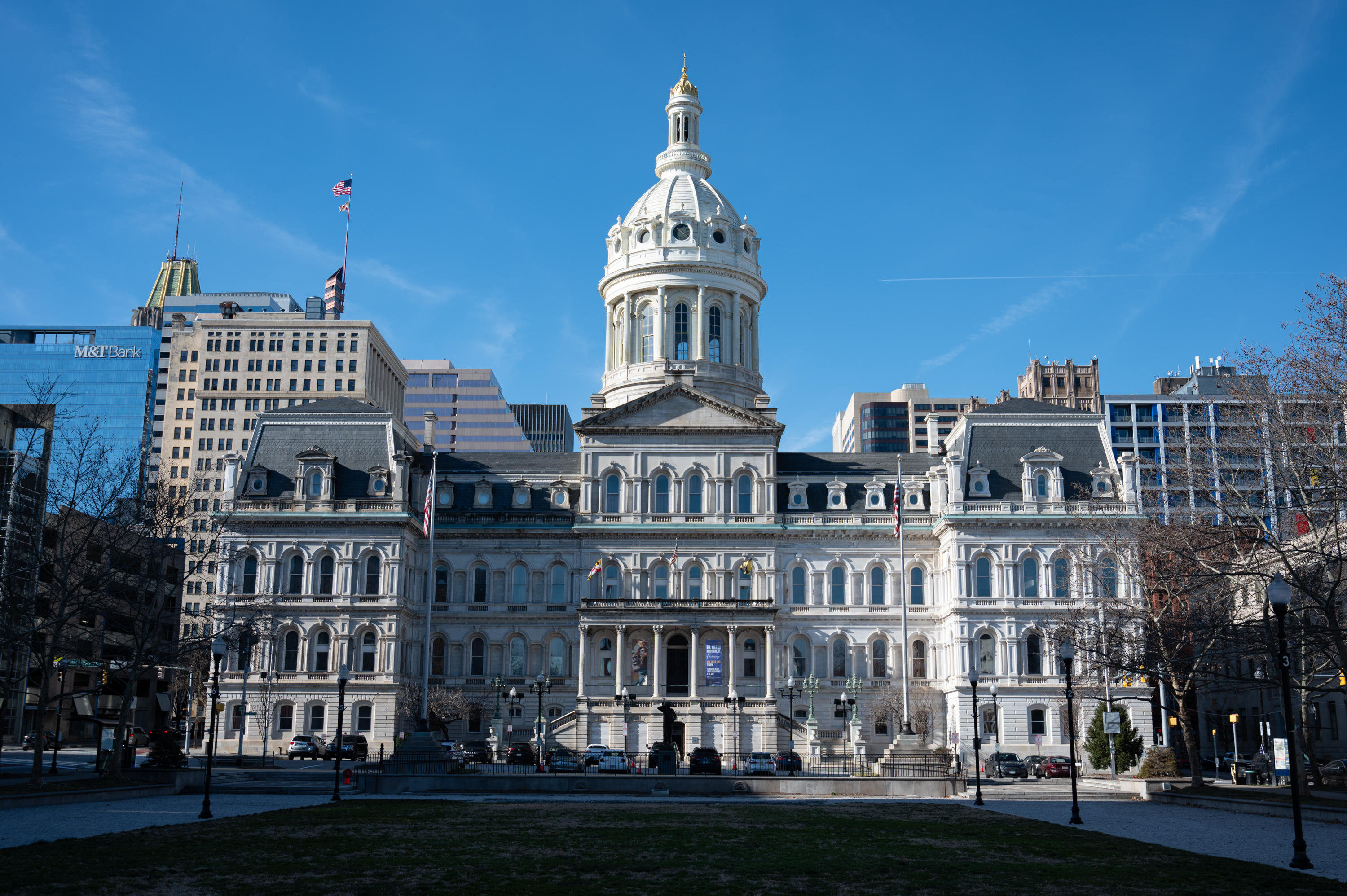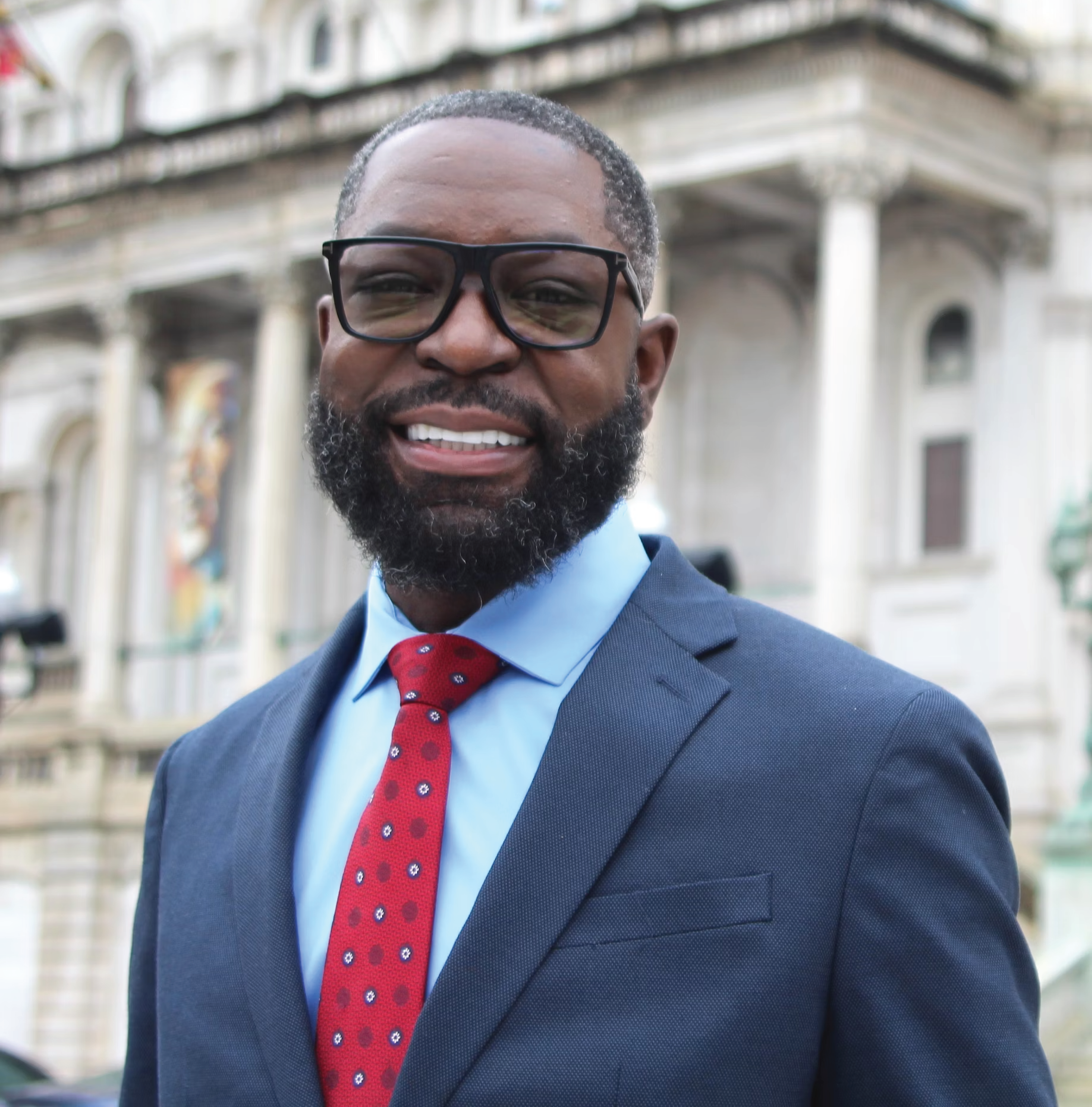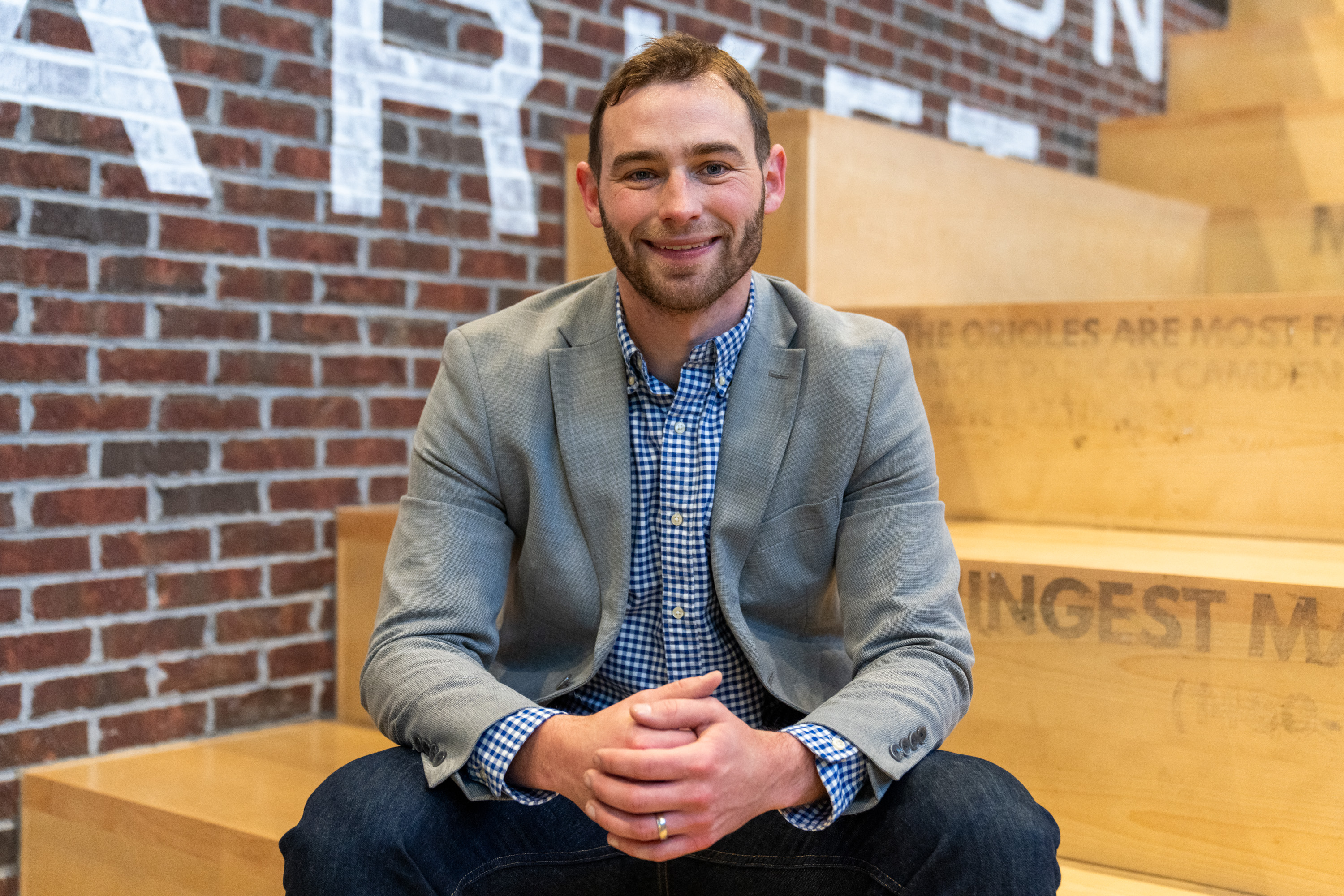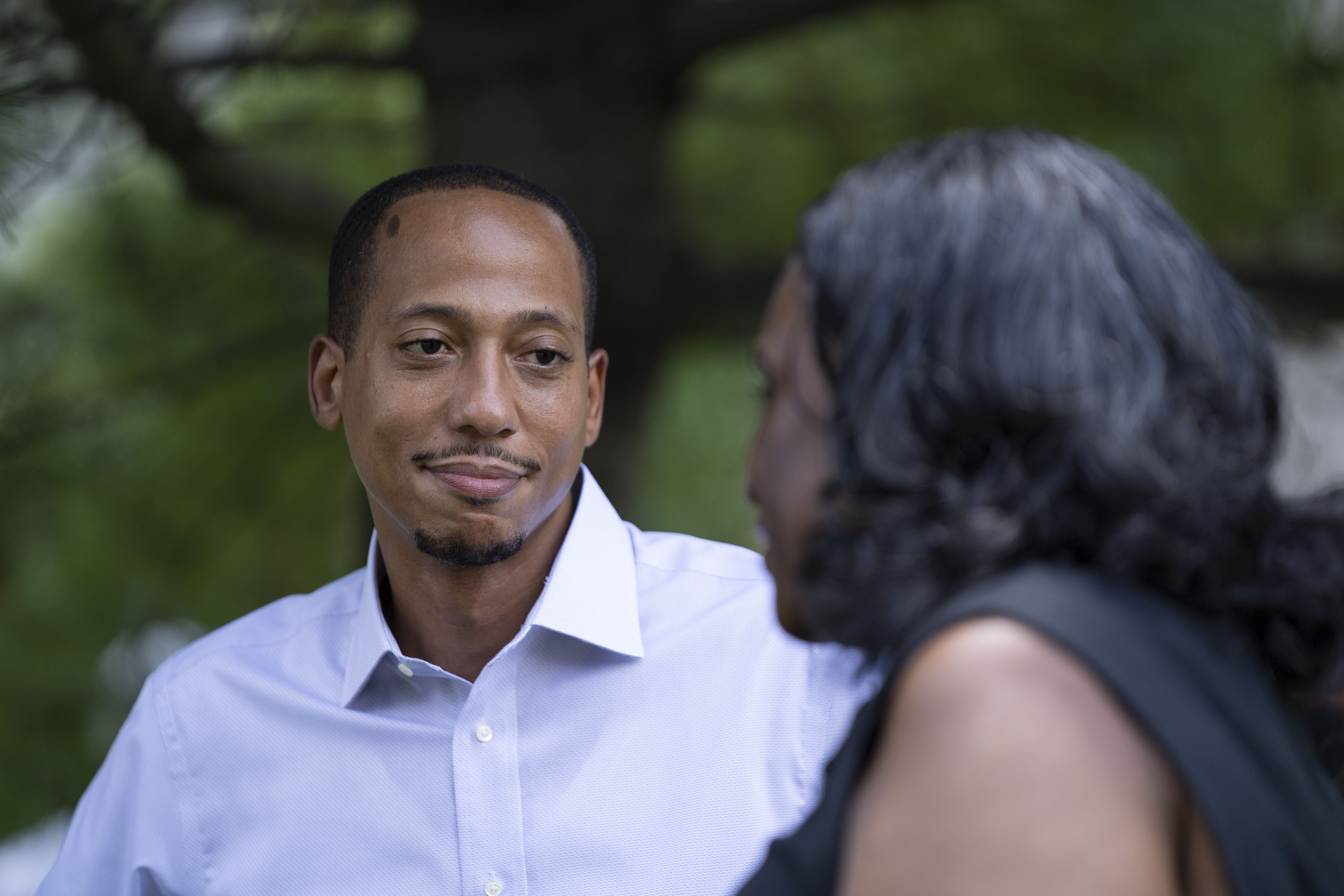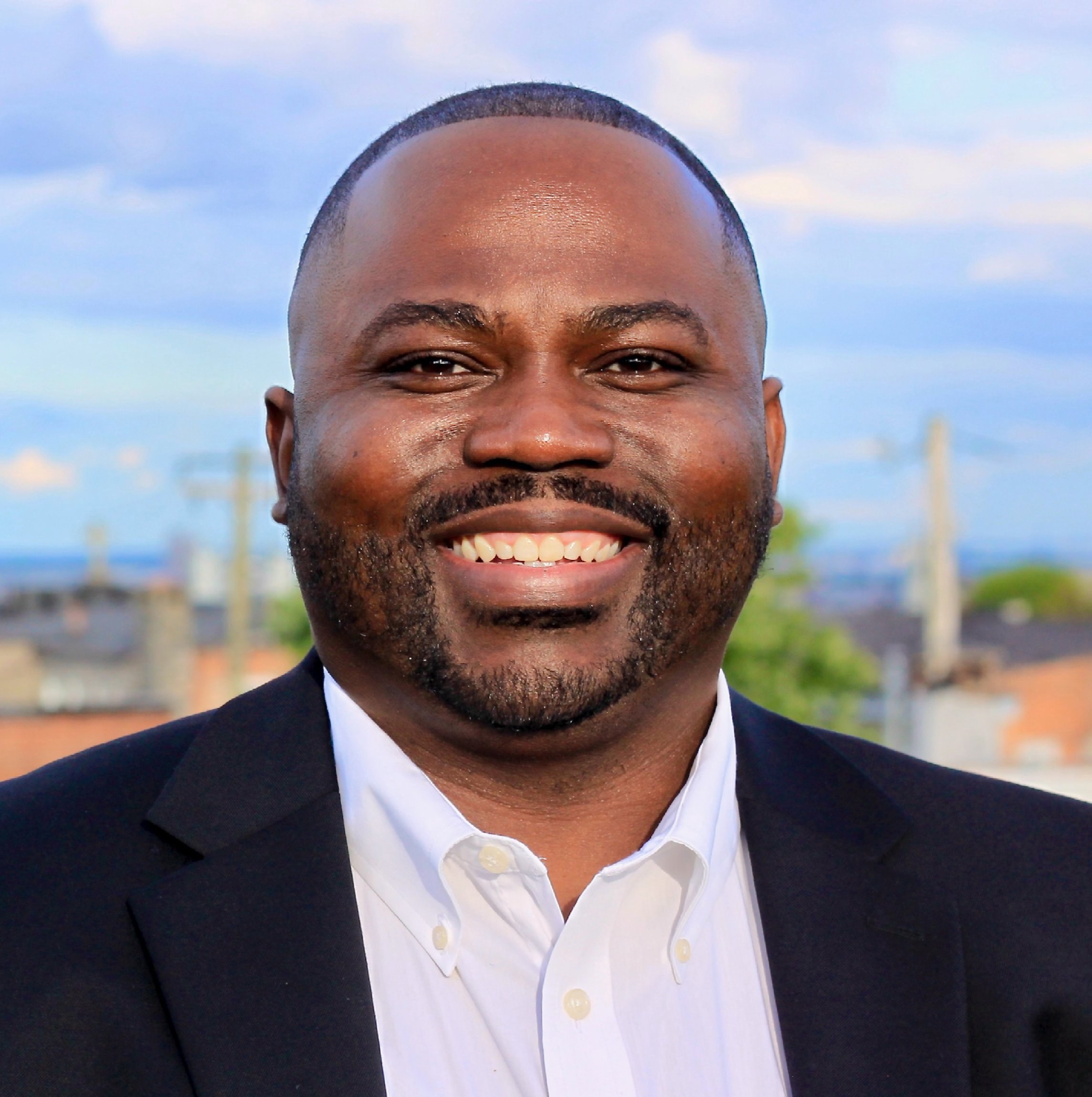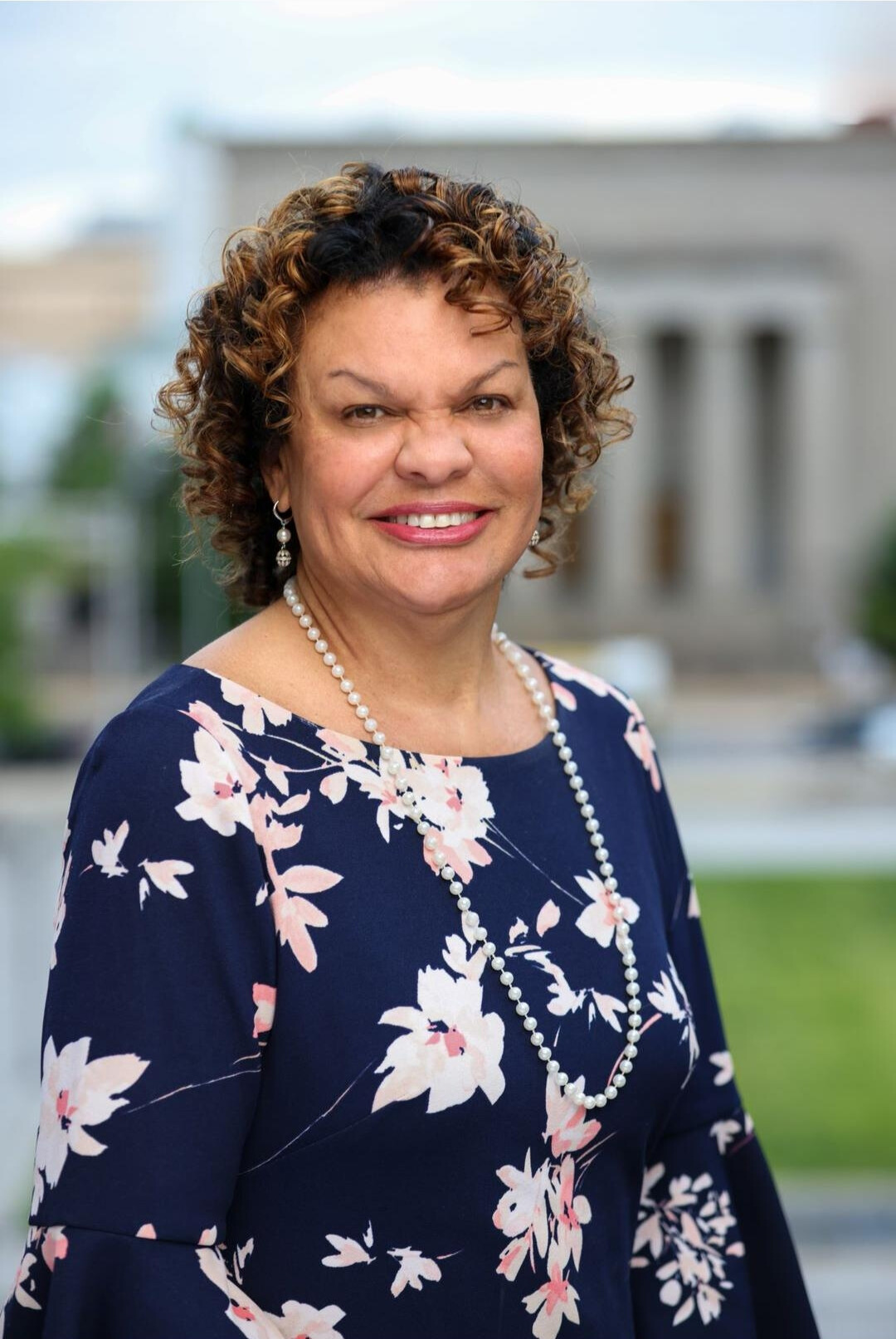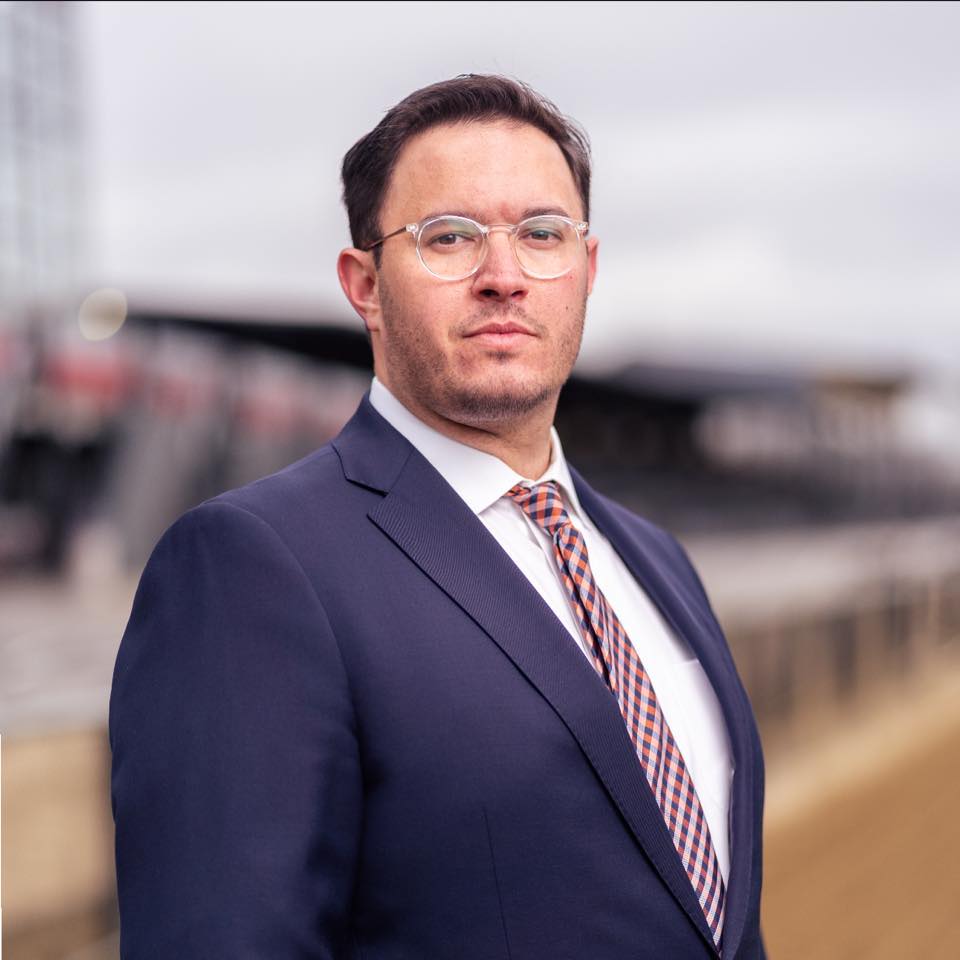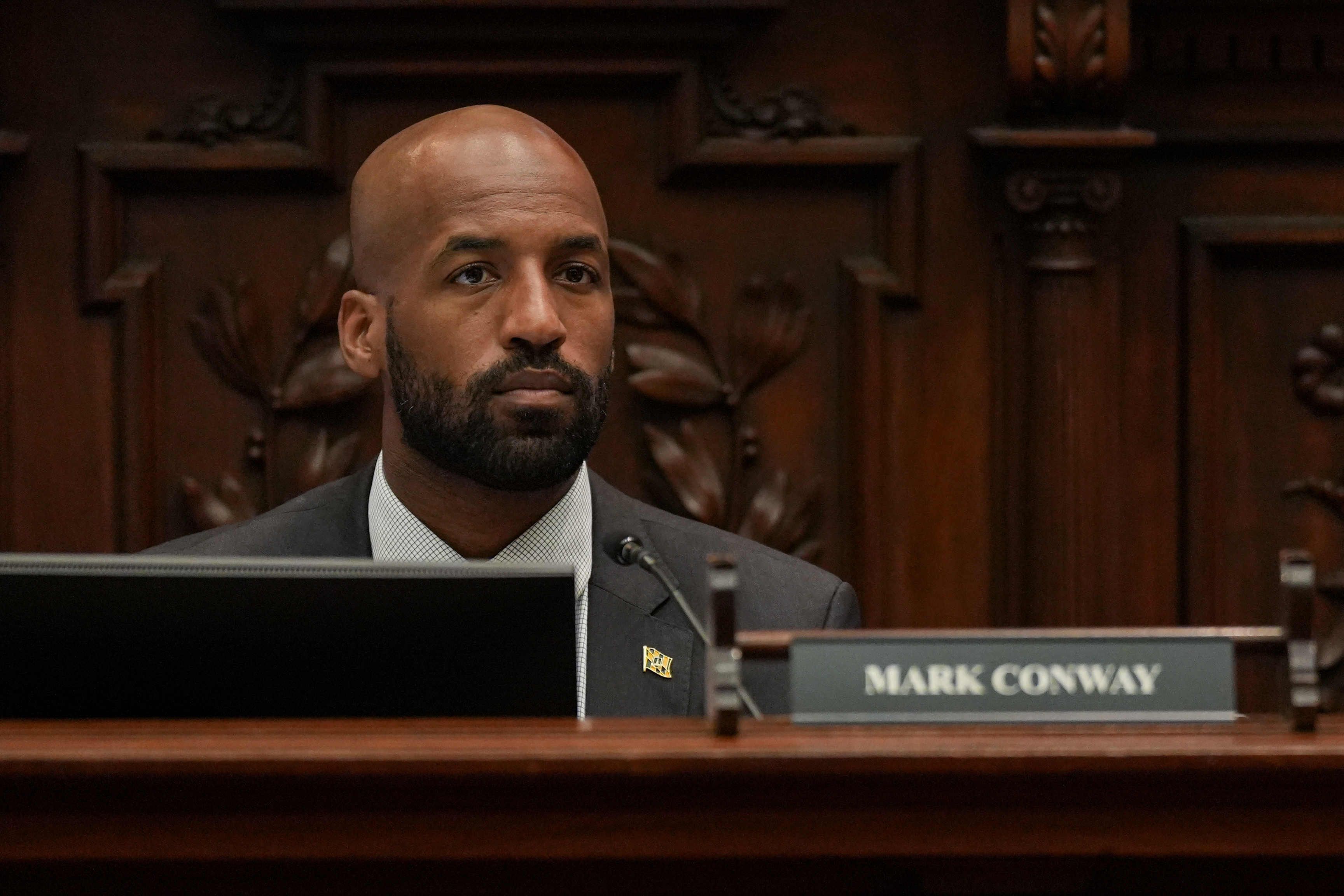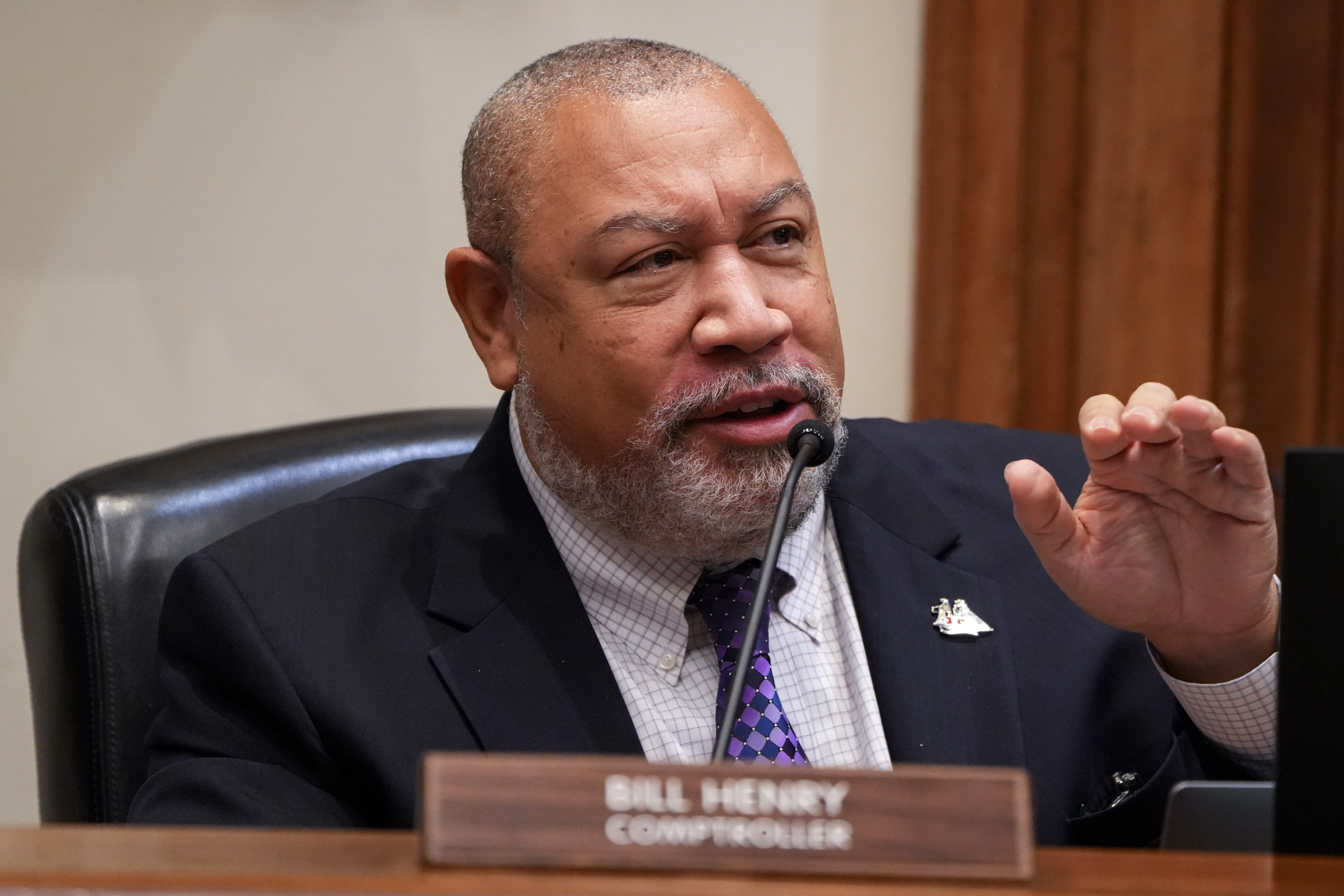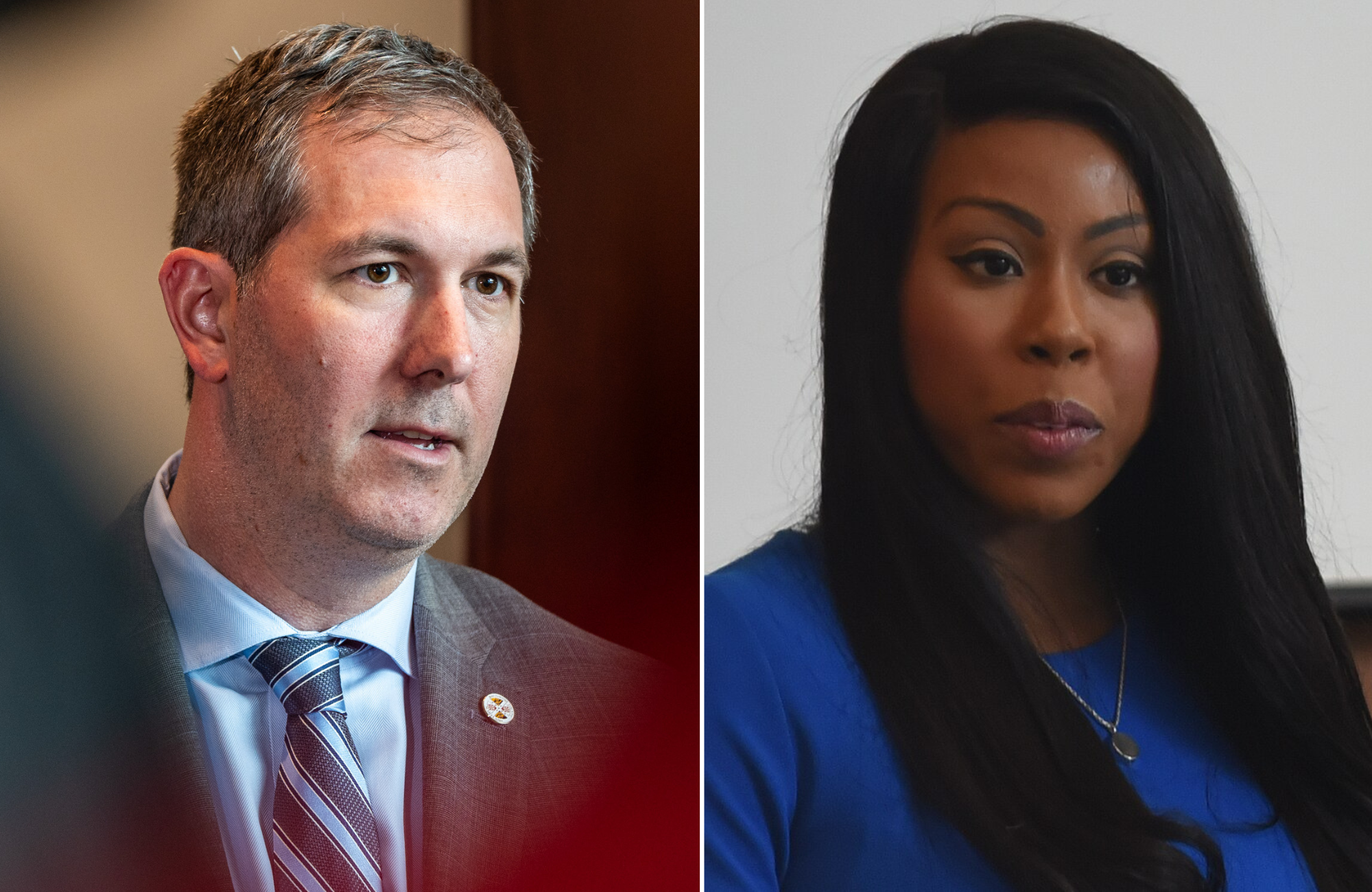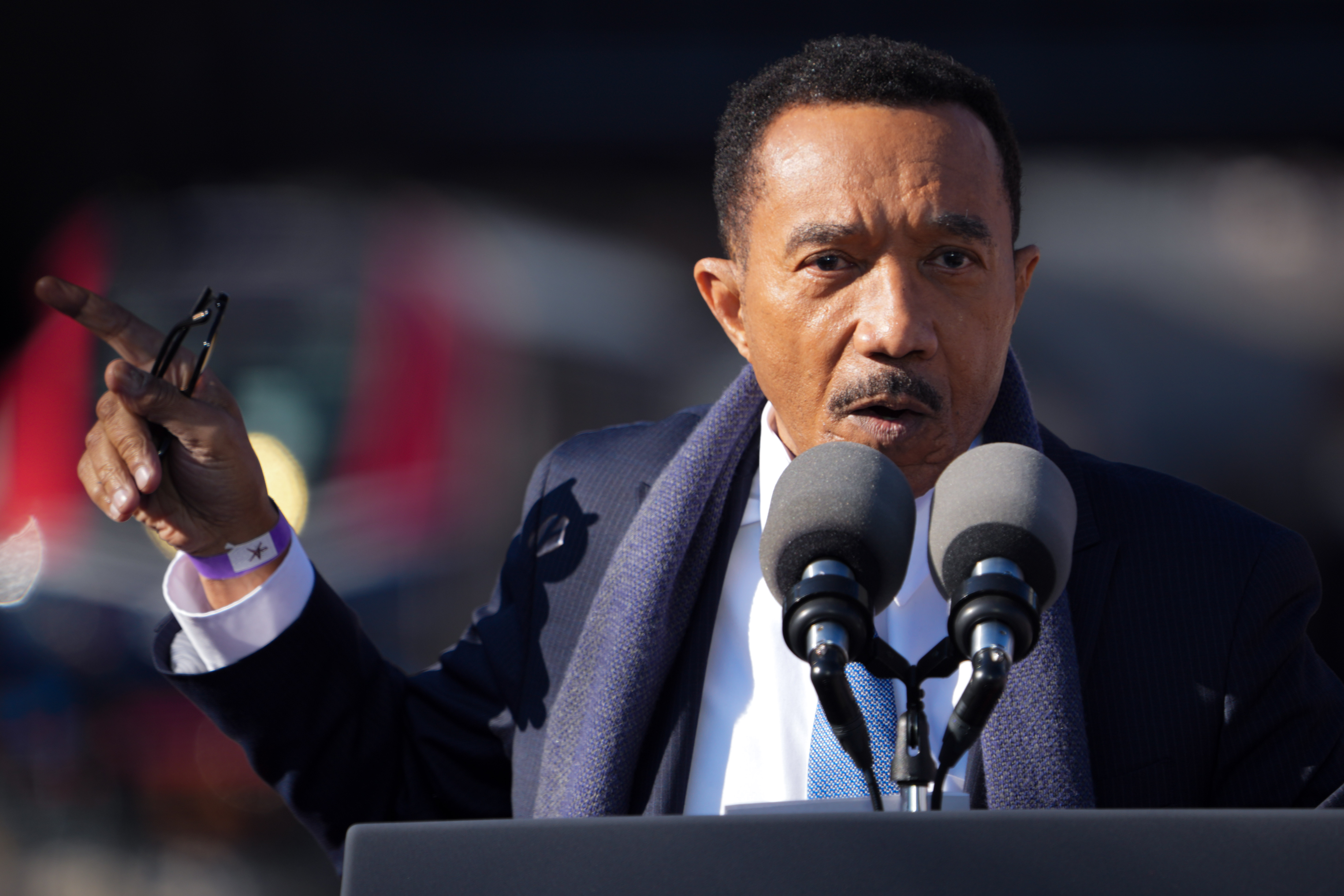What’s the job: Sets policy and chooses the school system superintendent. The board also approves the district budget.
The eight-member board includes five members elected by district, two members elected county-wide and a student member chosen by students. School board elections are nonpartisan. Primaries are held if there are more than two candidates seeking a seat, with the top two vote-getters advancing to the General Election.
District 1 — Elkridge and portions of Ellicott City
Name: Andre Gao
Age: 64
Personal: Married 32 years, 3 children, lives in Ellicott City
Education: Bachelor’s degree, University of Science and Technology of China; doctorate, physics, Duke University
Experience: First time running for public office
Endorsements: None at this time
Notable donors: No campaign finance contributors
Questionnaire
A: Maintain programs that attract many families to Howard County, such as elementary school GT programs and music programs. These programs also help propel our students toward future success. Keep class sizes small and ensure there are adequate support staff. This is crucial because larger class sizes can reduce instructional effectiveness, and fewer support staff may pull teachers away from focusing on instruction. Provide sufficient resources for special education programs. Special education students should receive the attention and support they need. We must allocate resources where they are needed so that special education students do not have to travel far for their education.
A: Students should not have access to cell phones during instructional hours, as their use can distract students from learning and disrupt teachers’ ability to teach. Many teachers have raised this issue with the Board of Education in the past, but their concerns were not addressed. Students’ access to personal devices should only be allowed if the devices are for medical purposes. Even in such cases, students should provide a doctor’s note before being permitted to use personal devices in schools.
A: We should actively recruit teachers by targeting colleges known for producing educators and attending professional conferences. Additionally, we should advertise our positions in professional publications, emphasizing the benefits of teaching in Howard County. For our current teachers and those we successfully recruit, we must offer the necessary support. It’s essential to understand their needs and concerns and address them effectively. We should also provide ongoing training opportunities to help them excel in their roles and grow professionally.
A: I do not believe there should be restrictions on the content available to students in school libraries, as long as it benefits their education and prepares them for college and careers. In fact, I will advocate for providing all books that help improve students’ proficiency in Mathematics and English Language Arts. It’s important to note that nearly 60% of students in our county are not proficient in Mathematics, and almost 40% are not proficient in English Language Arts. A parent recently contacted me about a shortage of books in a GT class, where the teacher had to retype textbook materials for students, and parents had to raise funds to purchase books. I would advocate for using our valuable school budget to ensure these GT class books are made available to students.
A: If school boundaries in our county need to be redrawn, the top priority should be creating stable, community-based school attendance areas. Transporting students outside their communities can weaken their connection to the communities they live in. Additionally, longer bus rides mean students will have less time to sleep, adding more stress to their already stressful and demanding school lives. Students who participate in before- or after-school activities will also face greater difficulty getting home. Furthermore, random redrawing of school boundaries deprives families of the freedom to choose the schools they want for their children. Many families move to specific areas of our county so their children can attend the school they specifically chose. Randomly redrawing boundaries disrupts their educational plans and may even cause financial loss due to the potential devaluation of their homes.
A: School construction and renovation cannot be avoided when we face overcapacity issues or the need to maintain a safe and healthy environment for students and teachers. We should treat our schools as we would our own homes. If our family grows, we typically move to a larger house or apartment. If there’s a maintenance issue at home, we fix or renovate immediately. So why should we defer maintenance on our schools? Why should we let our students suffer? Therefore, school construction and renovation should not be delayed. Regarding taxes, I do not advocate for tax increases. School construction and renovation can be accomplished without raising taxes. The county government can provide funding for these projects by reallocating money to schools at the average historical percentage of the total county budget. We should also advocate for increased state support for school construction and renovation due to rapid rising population and student enrollment. The state should allocate more funds to fast-growing counties like Howard County.
A: The Howard County Board of Education is a non-partisan position, and I am an unaffiliated voter running for this role. I have no party endorsements or support from political establishments. I listen to voters whose voices are often ignored, and I aim to serve everyone across party lines, including those underrepresented by the current Board of Education incumbents or other candidates. My focus is solely on education: recruiting and retaining the best teachers, ensuring the best learning environments for students, providing a top-tier curriculum, and delivering a bright future for all students. With over 30 years of experience in the financial industry, including nearly 20 years at management position, I am uniquely equipped to address the budget challenges facing our school system. I also have three children who attended Howard County public schools, all of whom went on to college. My oldest has earned a Ph.D. Therefore, I understand what it takes to prepare children to be college or career ready. I’ve demonstrated my hardworking spirit throughout this campaign. Please vote for me, vote for Andre Gao, so I can work for you. Thank you.
Spring questionnaire
Read the candidate’s answers to a previous Banner questionnaire.
A: Maintain programs that attract many families to Howard County, such as elementary school GT programs and music programs. These initiatives also help propel our students toward future success. Keep class sizes small and ensure there are adequate support staff. This is crucial because larger class sizes can reduce instructional effectiveness, and fewer support staff may pull teachers away from focusing on instruction. Provide sufficient resources for special education programs. Special education students should receive the attention and support they need. We must allocate resources where they are needed so that special education students do not have to travel far for their education.
A: Students should not have access to cell phones during instructional hours, as their use can distract students from learning and disrupt teachers’ ability to teach. Many teachers have raised this issue with the Board of Education in the past, but their concerns were not addressed. Students’ access to personal devices should only be allowed if the devices are for medical purposes. Even in such cases, students should provide a doctor’s note before being permitted to use personal devices.
A: We should actively recruit teachers by targeting colleges known for producing educators and attending professional conferences. Additionally, we should advertise our positions in professional publications, emphasizing the benefits of teaching in Howard County. For our current teachers and those we successfully recruit, we must offer the necessary support. It’s essential to understand their needs and concerns and address them effectively. We should also provide ongoing training opportunities to help them excel in their roles and grow professionally
A: I do not believe there should be restrictions on the content available to students in school libraries, as long as it benefits their education and prepares them for college and careers. In fact, I will advocate for providing all books that help improve students’ proficiency in Mathematics and English Language Arts. It’s important to note that nearly 60% of students in our county are not proficient in Mathematics, and almost 40% are not proficient in English Language Arts. A parent recently contacted me about a shortage of books in a GT class, where the teacher had to retype textbook materials for students, and parents had to raise funds to purchase books. I would advocate for using our valuable school budget to ensure these GT class books are made available to students.
A: If school boundaries in our county need to be redrawn, the top priority should be creating stable, community-based school attendance areas. Transporting students outside their communities can weaken their connection to the communities they live in. Additionally, longer bus rides mean students will have less time to sleep, adding more stress to their already stressful and demanding school lives. Students who participate in before- or after-school activities will also face greater difficulty getting home. Furthermore, random redrawing of school boundaries deprives families of the freedom to choose the schools they want for their children. Many families move to specific areas of our county so their children can attend the school they specifically chose. Randomly redrawing boundaries disrupts their educational plans and may even cause financial loss due to the potential devaluation of their homes.
A: School construction and renovation cannot be avoided when we face overcapacity issues or the need to maintain a safe and healthy environment for students and teachers. We should treat our schools as we would our own homes. If our family grows, we typically move to a larger house or apartment. If there’s a maintenance issue at home, we fix or renovate immediately. So why should we defer maintenance on our schools? Why should we let our students suffer? Therefore, school construction and renovation should not be delayed. Regarding taxes, I do not advocate for tax increases. School construction and renovation can be accomplished without raising taxes. The county government can provide funding for these projects by reallocating money to schools at the average historical percentage of the total county budget. We should also advocate for increased state support for school construction and renovation due to rapid rising population and student enrollment. The state should allocate more funds to fast-growing counties like Howard County.
A: I have over 30 years’ financial industry experience and nearly 20 years’ management experience, which are essential for resolving the school budget issues and for overseeing the operation of the school system.The Howard County Board of Education is a non-partisan position, and I am an unaffiliated voter running for this role. I have no party endorsements or support from political establishments. I listen to voters whose voices are often ignored, and I aim to serve everyone across party lines, including those underrepresented by the current Board of Education incumbents or other candidates. My focus is solely on education: recruiting and retaining the best teachers, ensuring the best learning environments for students, providing a top-tier curriculum, and delivering a bright future for all students. With over 30 years of experience in the financial industry, including nearly 20 years at management position, I am uniquely equipped to address the budget challenges facing our school system. I also have three children who attended Howard County public schools, all of whom went on to college. My oldest has earned a Ph.D. Therefore, I understand what it takes to prepare children to be college or career ready. I’ve demonstrated my hardworking spirit throughout this campaign. Please vote for me, vote for Andre Gao, so I can work for you. Thank you.
Name: Meg Ricks
Age: 43
Personal: Married 21 years, 3 children, lives in Elkridge
Education: Bachelor’s degree, anthropology, Brigham Young University
Experience: Ran unsuccessfully for an at-large seat on the school board in 2022; elected to multiple PTA leadership positions including president, treasurer and secretary
Endorsements: Howard County Education Association, Columbia Democratic Club, Howard Progressive Project
Notable donors: No campaign finance contributors
Questionnaire
A: I believe that HCPSS needs to prioritize what impacts the classroom—including reducing class sizes, retaining our amazing educators, and meeting our legal obligations. With a national teacher shortage, we can’t afford to lose dedicated and talented educators. With the increasing challenges in the classroom, we can’t put even more work on them. Our schools must follow the law in providing the free and appropriate public education to which all learners, including those with disabilities, are entitled with fidelity. We also need to meet the requirements of the Blueprint for Maryland’s Future. We have to expand access to early childhood education, attract and retain amazing teachers, help students become college and career ready, and make sure that every student has the educational supports they need to succeed. The budget must advance these goals.
A: Phones should be put away and silenced during class. They should be out of sight and out of mind. It should not be on teachers alone to enforce this. Our middle school installed a locker in the office, and any student misusing their phone must lock it up until the end of the day. We also need support from parents. If alerts are off and phones are away, they can leave a message for the student to get to later. Urgent messages can be called into the office. There are reasons students may need to have a phone like medical, work, or for peace of mind as they walk to and from school. That is why we must help students learn to self-regulate their cell phone usage but also enforce policies when students are not able to by themselves.
A: Securing adequate funding for educator pay is crucial as we will have to compete with other jurisdictions that have lower costs of living and the same requirements for starting teacher salaries as a result of the Blueprint. We will also need adequate funding to keep our veteran teachers. Creating new opportunities for these teachers to advance and become leaders in their schools while mentoring new teachers is a win-win that can help to retain all of our educators. Taking steps to address workload and to give educators more autonomy and support in their jobs is also crucial. Utilizing the opinions and experience of our educators in making decisions that directly impact them is essential. If our school system is forced to frequently cut positions, that also really sets back recruitment and retention efforts. We need to nurture and sustain a culture of inclusivity that celebrates the diversity of our community and is not afraid to address bias. We need diversity at all levels and diverse perspectives in decision making and leadership. We can continue to support programs to “grow our own” teachers among current students interested in pursuing the field of education.
A: No. I support the rights of parents to guide what their own children read, but no single person or group gets to dictate what every student has access to. I trust our media specialists to offer age appropriate materials in our school libraries. There is a process in place to get community feedback on all materials and to request re-evaluation if there are concerns. To prepare children for the future, we need to teach them both the good and the bad of our history. We want our students to learn important, age-appropriate lessons about the role of race and racism in the shaping of America because it’s the best way to ensure the next generation doesn’t repeat the mistakes of our past. LGBTQ+ students should have the same freedom to study in a supportive learning environment as any other student, despite the attempts of some politicians to demonize them and to stoke fear for political gain.
A: Boundaries must be redrawn when capacity is out of balance and when we open new schools. We need to be opening new schools because we are years behind, as evidenced by our growing fleet of “relocatable classrooms.” Because overcrowding worsens outcomes for our most vulnerable students, we need to address capacity first and foremost. The other factors outlined in Policy 6010 help us select the best plan to address capacity without creating new problems. We don’t want to concentrate poverty, create small feeds, move the same children multiple times, or put walkers onto buses that we can’t afford and for which we don’t have drivers. We need to consistently apply all of the considerations so that we don’t have one set of rules for one part of the county and a different set of rules for another part of the county. We also need school sites in areas where capacity is needed now and in the future. This will make creating school boundaries far easier than it is now. We also want to ensure that any redistricting plan will address capacity concerns for a long period of time so that it does not have to be done frequently.
A: Every student and staff member deserves to learn and work in a building that is in good repair and which will not make them sick. We need more dedicated funding for the capital budget. Our county must ensure that development fees are sufficient to cover the growth they bring, so we do not run out of money to renovate and repair our aging schools. Within the current constraints, we need to make decisions based on objective data. It is difficult to plan far in advance if our long-term plan changes drastically every single year. We need money now, but usually “money now” comes at a high cost in the long run. If delaying a project is going to cost us more money than moving forward with it, that is crucial information to know. We also need to make sure we are taking advantage of any state money we could be receiving for capital projects. I am interested in seeing how the schools funded by public-private partnerships (P3s) in Prince George’s County impact their school system in the long run. Any potential P3 for school funding would need to be thoroughly scrutinized by the Board, the County, and the community.
A: My background in the preschool classroom and as a community leader, education advocate, and HCPSS parent have uniquely qualified me to serve on the Board. As a child recipient of Free and Reduced Meals (FARMs) and other programs for families in poverty, I personally experienced the importance and power of public education to change lives. Serving others in my community has been a life-long pursuit. My time on the Operating Budget Review Committee (OBRC) and many years of PTA leadership deepened my understanding of the fiscal and other challenges we face. I have followed and participated in the work of the Board for 15 years and am ready to bring my experience, creative problem solving, consensus building, and passion for education to this role. Those familiar with my leadership have described me as fair, calm, and level-headed. Serving as one of the co-chairs of last year’s OBRC, I had the opportunity to put into practice these leadership skills while building consensus in what can sometimes be a fractious group because of its size, passion, and diversity of opinions, not to mention the difficulty of last year’s budget.
Read the candidate’s answers to a previous Banner questionnaire.
Spring questionnaire
A: I believe that HCPSS needs to prioritize what impacts the classroom — including class size, retaining our amazing educators, and meeting our legal obligations. With a national teacher shortage, we can’t afford to lose dedicated and talented educators. With the increasing challenges in the classroom, we can’t put even more work on them. Our schools must follow the law in providing the free and appropriate public education that all learners, including those with disabilities are entitled to, with fidelity. We also need to meet the requirements of the Blueprint for Maryland’s Future. We want to expand access to early childhood education, attract and retain amazing teachers, help students become college and career ready, and make sure that every student has the educational supports they need to succeed. The budget must advance these goals.
A: I believe our schools should focus on having a more effective disciplinary process. Many students are experiencing a social and emotional skills gap. We need to help students build tools for dealing with conflict and connect students to resources to ensure needs are being met. As we work to address root causes of disruptive behavior we also need to make sure that the targets of bullying and violence are not being further victimized. School safety is not a one person job. It really does take a whole community. We must start while students are young to give them tools for dealing with conflict and seeking help when needed. Every student should both feel safe at school and be safe at school. Altercations in schools should be handled by school staff. An SRO familiar with the students is much better than a random police officer when police assistance is needed, but staff should be handling the vast majority of situations before they become serious. I would like to see more counselors in our schools so students have more access to them to help them find productive solutions to the challenges they are facing.
A: Securing adequate funding for educator pay is going to be crucial as we will have to compete with other jurisdictions with lower cost of living and the same requirements for starting teacher salaries due to Blueprint. We will also need adequate funding to keep our amazing veteran teachers. Building in opportunities for veteran teachers to advance and become leaders in their schools while mentoring new teachers is a win-win that can help to retain both new and veteran teachers. Taking steps to address workload and to give educators more autonomy and support in their jobs are also crucial. Utilizing the opinions and experience of our educators in making decisions that directly impact them is essential. If our school system is forced to cut positions every year or most years, that also really hurts recruitment and retention. We need to nurture and sustain a culture of inclusivity that celebrates the diversity of our community and is not afraid to address bias. We need diversity at all levels and diverse perspectives in decision making and leadership. We can continue to support programs to “grow our own” teachers among current students as well as with career changers.
A: I support parents’ right to restrict what their own children read, but no single person or group gets to dictate what every student has access to. I trust our media specialists to offer age appropriate materials in our school libraries. There is a process in place to get community feedback on all materials and to request re-evaluation, if there are concerns. To prepare children for the future, we need to teach them both the good and the bad of our history. We want our students to learn important, age-appropriate lessons about the role of race and racism in the shaping of America because it’s the best way to ensure the next generation doesn’t repeat the mistakes of our past. LGBTQ+ students should have the same freedom to study in a supportive learning environment as any other student, despite the attempts of some politicians to demonize them and to stoke fear for political gain.
A: Boundaries must be redrawn at times when capacity is out of balance and when we open new schools. We need to be opening new schools because we are years behind, as evidenced by our growing fleet of “relocatable classrooms.” Because overcrowding worsens outcomes for our most vulnerable students, we need to address capacity first and foremost. The other factors outlined in policy 6010 help us select the best plan to address capacity without creating new problems. We don’t want to concentrate poverty, create small feeds, move the same children multiple times, or put walkers onto buses that we can’t afford and don’t have drivers for. We need to have a consistent application of the different considerations so that we don’t have one set of rules for one part of the county and a different set of rules for another part of the county. We also need school sites in areas where capacity is needed now and in the future. This will make creating attendance boundaries far easier than it is now. We also want to ensure that any redistricting plan will address capacity concerns for a long period of time so that it does not have to be done frequently.
A: Every student and staff member deserves to learn and work in a building that is in good repair and which will not make them sick. We need more dedicated funding for the capital budget. Our county should make sure that development fees are actually sufficient to cover the growth they bring so we do not run out of money to renovate and repair our aging schools. Within the current constraints, we need to make decisions based on objective data. It is difficult to plan long-range if our long-range plan changes drastically every single year. If delaying a project is going to cost us more money than moving forward with it, that is crucial information to know. We need to make sure we are taking advantage of any state money we could be receiving for capital projects. I am interested in seeing how the P3 funded schools in Prince George’s County impact their school system in the long run. I know that we need money now, but usually “money now” comes at a high cost in the long run. Any potential public private partnership for school funding would need to be thoroughly scrutinized by the Board, the County, and the community.
A: My background in the preschool classroom and as a community leader, education advocate, and HCPSS parent have uniquely qualified me to serve on the Board. As a recipient of Free and Reduced Meals (FARMs) and other programs for families in poverty as a child, I personally experienced the importance and power of public education to change lives. Serving others in my community has been a lifelong pursuit. My time on the Operating Budget Review Committee (OBRC) and many years of PTA leadership deepened my understanding of the fiscal and other challenges we face. I have followed and participated in the work of the Board for over 14 years and am ready to bring my experience, creative problem solving, consensus building, and passion for education to this role. Those familiar with my leadership have described me as fair, calm, and level-headed. Serving as one of the co-chairs of this year’s OBRC, I’ve had an opportunity to put into practice calm leadership and consensus building in what can sometimes be a fractious group because of its size, passion, and diversity of opinions, not to mention the difficulty of this year’s budget. I am ready to bring these needed skills to the Board.
District 2 — Columbia and portions of Ellicott City
Name: Larry Doyle
Did not respond to biographical questions or candidate questionnaire.
Name: Antonia Watts
Age: 43
Personal: Married, with children
Education: Bachelor’s degree, mechanical engineering, University of Delaware; master’s degree, bioengineering, University of California Berkeley; master’s degree, secondary education, University of Michigan
Experience: Board of Education member since 2020
Questionnaire
A: In my first term, I led the effort to develop strategic goals that were focused on student outcomes. These goals, reading by grade 3, middle school mathematics proficiency, college and career ready, become cornerstone for the superintendent evaluation and school system’s strategic plan. The school system should focus the budget on these goals.
A: I believe students should keep their personal devices turned off and in their backpacks for the duration of the school day.
A: Currently, there are fewer college graduates going into the field of education, so recruiting quality educators, especially teachers of color, is already a challenge. Therefore, we must seek to recruit from alternative pathway programs and historically black colleges and universities as well as from traditional teaching programs. Once we have hired amazing educators we have to be sure to retain them by giving them the support that they require to be successful in a demanding field. This could include increasing the salary or decreasing the teacher workload, both of which I have achieved in my first term. Additionally, we must also make the workplace welcoming through equity, inclusivity, and implicit bias training.
A: Parents have the ability to view all curriculum materials used by HCPSS and have the ability to opt their children out of certain topics. However, rightfully so, parents do not have the right to limit what other parents and children choose for themselves. All children deserve to see themselves and their friends in instructional materials and in media center books.
A: Capacity should be the priority for redistricting.
A: I believe in prioritizing investments that directly impact student educational outcomes. This includes allocating funds towards hiring and retaining highly qualified teachers, providing professional development to enhance teaching effectiveness, and implementing evidence-based instructional practices tailored to meet the diverse needs of our student body. I am committed to engaging with stakeholders to ensure that funding decisions align with our community’s shared values and priorities. Any funding shortfalls should be addressed by both increasing the county share for education and reevaluating the programs that HCPSS currently runs. There are no “best areas” to cut as each item provides services to students. Teacher pay is the last place that should be cut.
A: I am running because it is urgent that we develop a system where every child has access to an education that fits their needs. In my current term, my focus has centered on student achievement, educator support, and fiscal responsibility achieved through the development of strong accountability measures. To improve identification of reading difficulties, I increased access to a reading screening tool for all elementary school students. I added several positions to special education to handle administrative duties, freeing our special educators to spend more time focused on students. Additionally, I was instrumental in redesigning the budgetary process to increase community engagement and advocacy for funding for public education. While I am proud of the accomplishments that I have highlighted, I am running because there is still much work to be done. Finally, as the incumbent with a strong track record, I am confident in my ability to raise the necessary funds to attract voters on election day.
District 3 — North Laurel, Savage, portions of Columbia
Name: Jolene Mosley
Did not respond to biographical questions or candidate questionnaire.
District 4 — Clarksville, Fulton and portions of Columbia
Name: Julie Kaplan
Age: 52
Personal: Married 29 years, 2 children, lives in Fulton
Education: Bachelor’s degree, economics, University of Maryland, College Park; master’s degree, business administration, University of Maryland, College Park.
Experience: First time running for public office
Endorsements: Former Howard County Executive Allan Kittleman; former County Councilman Jon Weinstein
Questionnaire
A: The top priorities for the school system budget should be maintaining academic excellence, ensuring physical and psychological safety, and fully funding the Blueprint for Maryland’s Future. To support these priorities, a focus on identifying inefficiencies and unproductive expenses is critical, allowing for strategic reallocation of resources. This approach ensures that we not only meet but exceed our commitments to educational standards and safety while aligning with the ambitious goals set by the Blueprint for Maryland. Achieving this balance requires a methodical review of current expenditures, encouraging innovation, and fostering a culture of continuous improvement and accountability. By prioritizing these areas, we can ensure that our budgeting decisions reflect the values of our community and the needs of every student, laying a solid foundation for a future where every learner in Howard County has the opportunity to thrive.
A: The key to instituting effective disciplinary measures in schools lies in ensuring policies are universally applied and align with restorative justice principles, which focus on uncovering root causes and facilitating reconciliation. Currently, the challenge is the inconsistency in policy application and the lack of time and practical tools for educators to implement these measures effectively amidst their administrative responsibilities. Teachers are pivotal to restoring discipline and respect in classrooms but are often overburdened, hindering their ability to engage deeply with restorative practices. To address this, we need a dual approach: streamlining administrative tasks to free up educators’ time and developing practical, in-class tools that support immediate conflict resolution. Engaging in dialogue with teachers to understand their needs and working collaboratively to refine disciplinary measures will ensure we support the premise of restorative justice while maintaining classroom order. This balanced strategy will reinforce discipline and respect for teachers, laying the groundwork for a conducive learning environment where all students feel valued and understood.
A: To recruit and retain top educators, competitive salaries and benefits are essential, but equally important is how we engage with them. Educators thrive on their passion for teaching and the energy they draw from their students. However, the burden of administrative responsibilities and policies that don’t always consider practical classroom implications can dampen this enthusiasm. While some outside-the-classroom duties are inevitable, we must critically evaluate their impact on teachers and seek ways to minimize unnecessary burdens. Additionally, educators often find themselves held accountable for decisions made by the Board of Education without feeling they have a voice in those decisions. This dynamic must shift. Engaging educators in policy development, listening to their insights, and valuing their contributions is crucial. By doing so, we not only respect their professional expertise but also empower them as key stakeholders in our education system. This inclusive approach is vital for attracting and retaining the quality educators necessary to ensure our students receive the best possible education.
A: It’s crucial to strike a balance between safeguarding access to diverse educational resources and adhering to established standards. Policy 8040 serves as a guideline, ensuring that instructional materials meet approved criteria, fostering an environment of learning that is both inclusive and respectful of community values. While it’s essential to maintain age-appropriateness and educational relevance, restricting access should be approached with caution, emphasizing the importance of community input and academic freedom. This approach supports the preparation of students for a diverse and complex world, ensuring they have access to a broad range of viewpoints and information. Encouraging open dialogue among educators, parents, and students about library content can further enhance understanding, ultimately benefiting the educational experience for all students.
A: By adhering to considerations outlined below, we aim to foster a balanced, supportive, and cohesive educational environment that respects the needs of all students and their families. School Capacity: We aim to evenly distribute student enrollment to avoid overcrowding, ensuring all schools utilize resources efficiently and maintain high educational standards. Preserving Title I Status: It’s crucial to maintain the eligibility for Title I funding in schools serving low-income areas, guaranteeing those schools continue to receive necessary financial and educational support. Minimizing Commute Times: Efforts should focus on reducing travel distances for students, especially those dependent on busing, to lower transportation costs and increase time for educational and extracurricular activities. Reducing Disruption: The process should strive to limit the number of students and families impacted, maintaining as much stability as possible for those transitioning to a new school. Keeping Communities Intact: Whenever practical, neighborhoods should remain together within school boundaries to support community cohesion and a sense of belonging among students.
A: In Howard County, we’re faced with the critical task of upgrading our schools while being mindful of our property tax rates—which, let’s be honest, are already on the higher side. It’s a balancing act, requiring a clear strategy that puts the safety of our students, the capacity of our schools, and the quality of our learning environments at the forefront. First and foremost, the safety of our children and educators is non-negotiable. Our schools need to be secure, up to code, and free from any hazards. Then, we look at our schools bursting at the seams. It’s essential that we address this by carefully analyzing our space versus our needs, ensuring every child has the room to learn and grow without overcrowding. And once we have a handle on safety and space, we turn our attention to making our schools not just functional, but inspiring. We’re talking about environments that spark curiosity and foster a love for learning. This approach is practical and mindful of the taxpayers. Together, we can make Howard County’s schools places where our kids not only learn but thrive — without making our property tax bills nightmarish.
A: Howard County is on the brink of necessary transformation, seeking leadership that prioritizes objectivity, practicality, and fiscal responsibility above all. As a Marketer and RevOps executive, I’m the leader companies call upon when they are ready for transformation and leveling up—attributes District 4 and our students desperately need to navigate the future successfully. My approach is nonpartisan; I believe in making decisions based on what’s best for our children and our community, not politics. With a proven track record in driving meaningful change and optimizing resources, I stand as the most experienced candidate ready to elevate our school system. Electing me means choosing a candidate committed to a nonpartisan, results-driven approach, ensuring our education system mirrors the excellence our community deserves.
Name: Jen Mallo
Age: 55
Personal: Married 30 years, 3 children, lives in Columbia
Education: Bachelor’s degree, economics and East Asian studies, Wittenberg University; master’s degree, George Washington University; education finance certificate, Georgetown University.
Experience: Member of Howard school board; elected in 2018 and reelected in 2020
Endorsements: Columbia Democratic Club, Howard Progressive Project
Questionnaire
A: Student safety—students who do not have a safe and inclusive environment are unable to access and take advantage of the academic programming that we offer. More than just physical security, this is about promoting mental health and well being, providing food for hungry students, cultivating an inclusive learning environment, ensuring safe transportation to school, establishing liaisons (BSAP, HSAP, International) to connect home and school, and delivering high-quality Special Education. Student academic achievement—students need to have high quality instruction that supports them at whatever level they enter our schools. This means we need comprehensive, effective, and intellectually stimulating teaching to every learner whether they are GT, special education, or on-grade level. Every student should be reading by third grade, on track in middle school mathematics to complete Algebra 2 by the end of high school (at a minimum), and ready to succeed in life after graduation. Staff recruitment and retention—our children need qualified, engaged, and committed staff. To that end, we must pay our teachers professional-level salaries, and we also should absolutely be working towards paying our support staff at least a living wage. In addition, we must address other factors that lead to staff leaving the profession.
A: Our classrooms and schools need to be phone-free. Teachers can either teach or police cell phones, but cannot do both. Students must have phone-free environments to be present and ready to learn. Whether the physical solution is phone pouches, phone lockers, or other mechanisms; students need a phone-free school environment. I recently took a class from Jonathan Haidt, Professor at New University and author of The Anxious Generation. Haidt provides data-backed reasoning for schools going phone-free by demonstrating the psychological harm being done to children by their cell phone use. He identifies that cell phones have interfered with children’s social and neurological development, from sleep deprivation to attention fragmentation, addiction, loneliness, social contagion, and social comparison. The solution to this problem is to go phone-free in schools. Furthermore, evidence is mounting that in emergency situations in schools, cell phone use by students can make them less safe by increasing the traffic load on the network—possibly overloading it, by circulating rumors that make it difficult to address the real emergency, and by texting parents who then flock to the school, which may get in the way of public safety officials.
A: Educator recruitment is most effective when you have a strong, well-functioning Human Resources (HR) department that offers contracts to qualified candidates in a timely manner with competitive salaries and benefits. We need to actively recruit at local universities as well as at Historically Black Colleges and Universities that have strong teacher degree programs. We should expand our network of programs that provide student teachers who could join HCPSS upon graduation. Additionally, HCPSS could pay wages from Labor Department grants to student teachers as a recruitment tool. To retain staff, we also must build a culture where educators want to work and feel supported. That support can take many different forms including affinity groups, mentoring, and professional development. Annual salary increases commensurate with inflation are also critical to retention. Other supplemental programs like loan forgiveness, housing supports, Blueprint career ladder, and financial incentives can also be effective retention mechanisms. During my certificate program in Education Finance with Georgetown University, I learned about an innovative system called “stay interviews” used elsewhere to retain new, high quality educators. The idea is to encourage people to stay in their jobs and to ask them what support they need to stay and be successful.
A: No, the Board of Education must not capitulate to extremists’ efforts to restrict the content available to students in school libraries. Book bans are restrictions on free speech that I do not support. Books in libraries should be age appropriate, as determined by subject matter experts: educators, librarians, and media specialists. These are the same people we entrust our children to every day and we should trust them in this work. Art and literature challenge us to think differently, to build empathy and compassion, and to find out who we are and what we believe in. Why would we want to restrict growth and human development by taking away someone else’s views of the world? Moreover, the books available in school libraries should be accurate and upfront in addressing our history and our realities, which includes slavery, racism, bigotry, misogyny, and violence. Many of the books that are being challenged are those that affirm the LGBTQ+ community and the lived experience of African Americans. Students should have access to books that allow them to see themselves and others in authentic ways. For LGBTQ+ youth, this has a direct correlation to reducing incidences of suicide and self-harm.
A: Capacity should always be the first consideration when determining school boundaries. After capacity, the other factors outlined in the school system’s redistricting policy should be balanced. State funding is often dependent on our ability to utilize the existing capacity that we already have invested taxpayer dollars in as we built schools in the past. If we do not first balance capacity with our existing seats, we limit the ability of the state to fund additional capital improvements, new buildings, and critically needed renovations. There are thirteen other factors to be evaluated as identified in HCPSS policy. These fall into three general categories of facility utilization, community stability, and demographics of the student population. Each of these factors should be evaluated and balanced so that no single factor skews the outcome disproportionately in a negative way. For instance, there cannot and should not be intentional school boundaries that create a disproportionate concentration of one race in a particular school as that could constitute illegal segregation. Our student body is incredibly diverse and our communities are changing and growing. I want to preserve this unique and critical strength of our community.
A: It is the role of the Board to build and maintain sufficient schools to ensure that students have a safe and adequate facility in which to learn. Since the Board of Education does not have taxing authority in Maryland, our efforts are limited to expressing the needs of our students and staff while using our allotted funds appropriately. I have worked collaboratively with elected officials, community organizations, PTAs, and others and have listened to the concerns of residents on this and will continue to do so. As Board Chair, I worked this past year with my colleagues and staff to form the Capital Budget Criterion Standardization Workgroup. This workgroup is developing a set of standardized criteria for determining how our limited capital budget dollars should be allocated to reach the locations with the greatest needs, without priorities swinging wildly from year to year. I want to bring long-term planning and stabilization to the process so that our local and state governments can adequately fund our needs. Furthermore, it is my hope that by convening this workgroup, we are able to maximize our ability to leverage state funding and not leave money on the table as we have in the past.
A: I am the only District 4 candidate who will not need years of on-the-job training to come up to speed. With at least two new Board members starting in December, my experience is needed now more than ever. I have served on the Board for six years and have decades of prior experience in education advocacy, policy work, and early childhood education. As Board Chair, I moved to institute changes to our contracting process to ensure future Board-approved contracts contain appropriate damage provisions as well as financial controls. I also helped eliminate the nearly $50 million health fund deficit two years ahead of schedule and passed record high, fiscally-sound budgets funded in collaboration with our government partners. During the pandemic, I brought in air quality and infectious disease specialists to advise the Board, resulting in air filters in every classroom, prioritized vaccine access, and rapid purchase of Chromebooks for virtual instruction. I have identified problems and implemented solutions to create better policies for students. During my tenure, we revised nearly all school system policies, implemented the first-ever equity policy, and enacted a new, student-centered dress code. In short, I am the most qualified candidate in District 4.
Read the candidate’s answers to a previous Banner questionnaire.
Spring questionnaire
A: Student safety — students who do not have a safe and inclusive environment are unable to access and take advantage of the academic programming that we offer. More than just physical security, this is about mental health and well being, providing food for hungry students, providing an inclusive learning environment, safe transportation to school, providing liaisons (BSAP, HSAP, International) to connect home and school, and Special Education. Student academic achievement — students need to have high-quality instruction that supports and grows them at whatever level they enter our schools. This means we need comprehensive, effective teaching to every learner whether they are GT, special education, or on-grade level. Every student should be reading by third grade, on track in middle school math to complete Algebra 2 by the end of high school (at a minimum), and ready to succeed in life after graduation. Staff recruitment and retention — our children need qualified, engaged, and committed staff. To that end, we must pay our teachers professional-level salaries and we also should absolutely be working towards paying our support staff at least a living wage. In addition, we must address other factors that lead to staff leaving the profession.
A: No, I don’t believe schools need to institute stronger disciplinary measures. Stronger measures and zero tolerance policies often lead to students being excluded from school. Suspension, detention, and expulsion keep students out of the classrooms where they should be learning and receiving their education. Policing of juvenile behaviors is an ineffective way to help children mature and grow and is more likely to increase the school-to-prison pipeline. Stronger disciplinary measures of the past have led directly to disproportionate discipline of boys, Black and Brown students, and special education students. Students need to be able to learn from their mistakes, take responsibility for their errors, and receive consequences that prioritize students staying in school, staying engaged, and having a pathway to continue to be a part of the classroom, the school, and the community.
A: Educator recruitment is most effective when you have a high-functioning Human Resources (HR) department that offers contracts to qualified candidates in a timely manner with competitive salaries and benefits. We need to actively recruit at local universities as well as at Historically Black Colleges and Universities that have strong teacher degree programs. HCPSS could expand our network of programs that provide student teachers who could join HCPSS upon graduation. Additionally, HCPSS could pay wages from Labor Department grants to student teachers as a recruitment tool. To retain staff, we also must build a culture where educators want to work and feel supported. That support can take many different forms, including affinity groups, mentoring, and professional development. Annual salary increases commensurate with inflation are also critical to retention. Other supplemental programs like loan forgiveness, housing supports, Blueprint career ladder, and financial incentives can also be effective retention mechanisms. During my certificate program in Education Finance with Georgetown University, I learned about an innovative program called “stay interviews” used elsewhere to retain high-quality, new educators. The idea is to encourage people to stay in their jobs and to ask them what support they need to stay and be successful.
A: No, I do not believe that the Board of Education should capitulate to efforts to restrict the content available to students in school libraries. Book bans are restrictions on free speech that I do not support. Books in libraries should be age appropriate, as determined by subject matter experts who have taken multiple courses in human development. These are librarians and teachers who we entrust our children to every day and we should trust them in this work. Art and Literature challenge us to think differently, to build empathy and compassion, and to find out who we are and what we believe in. Why would we want to restrict growth and human development by taking away someone else’s views of the world? Moreover, the books available in school libraries should be accurate and up front in addressing our history and our realities, which includes slavery, racism, bigotry, misogyny, and violence. Many of the books that are being challenged are those that affirm the LGBTQ+ community. Students should have access to books that allow them to see themselves and others in true and authentic ways. For LGBTQ+ youth, this has a direct correlation to reducing the incidence of suicide.
A: Capacity should always be the first consideration on school boundaries. After capacity, the other factors outlined in the school system’s redistricting policy should be balanced. If we do not first focus on capacity when redrawing school boundaries, it is unlikely that the state will continue to fund capital improvements, new buildings, and other renovations. Board members should then weigh the other factors outlined in the policy and take those items into consideration and the boundaries should be optimized for improved outcomes across the many considerations. At this time, I do not believe that the Board of Education will have another redistricting until we open a new school or have a school with a substantial capacity addition.
A: It is the role of the Board to build and maintain sufficient schools to ensure that students have a safe and adequate facility in which to learn. Since the Board of Education does not have taxing authority in Maryland, our efforts are limited to expressing the needs of our students and staff while using the allotted funds appropriately. As chairperson, I worked this past year with staff and the Board to form a capital budget criterion standardization workgroup. My hope is that this workgroup will be able to recommend standard criteria so that limited capital budget dollars can be allocated to the locations with the highest needs, with priorities not swinging wildly from year to year. I want to bring long-term planning and stabilization to the process so that our funding authorities can adequately fund our needs. Furthermore, it is my hope that by holding this workgroup, we are able to maximize our ability to leverage state funding and not leave money on the table as we have in the past.
A: I am unique among the candidates with six years on the Board and decades of education advocacy, policy work, and early childhood education. I am the only District 4 candidate who will not need years of “on the job training” to come up to speed. With at least two new Board members guaranteed, my experience is needed now more than ever. As Board Chair, I moved to institute changes to our contracting process to ensure future Board-approved contracts contain appropriate damage provisions as well as financial controls. I helped eliminate the nearly $50 million health fund deficit two years ahead of schedule and passed record-high, financially sound budgets funded in collaboration with our elected officials. I brought in air quality and infectious disease specialists to advise us during the pandemic, resulting in air filters in every classroom, prioritized vaccine access, and rapid purchase of Chromebooks for virtual instruction. I have identified problems and implemented solutions to create better policies for students. During my tenure, we revised nearly all of HCPSS’ policies, implemented the first-ever equity policy, and enacted a student-centered dress code. I am the most qualified candidate in District 4.
District 5 — Dayton, Lisbon, Highland, Woodbine
Name: Andrea Chamblee
Age: 63
Personal: Widow of John McNamara, who was murdered in the Annapolis Capital Gazette 2018 shooting, remarried in 2022, grew up in Howard County and currently lives in District 5
Education: Bachelor’s degree, journalism, University of Maryland, College Park; graduate of University of Maryland Law School.
Experience: First time running for public office. Holds unelected positions as a regulatory affairs professional fellow and with Everytown for Gun Safety.
Endorsements: Howard County Education Association, Columbia Democratic Club, Howard Progressive Project
Questionnaire
A: HCPSS has both an operating budget and a capital budget. On the operating side, classrooms come first. Class sizes need to be smaller, students and teachers need adequate resources, advanced learners need challenging opportunities, and students who need more support deserve to get it. Every building also needs more counselors, special educators, and paraprofessionals. Second, I support allocating additional funding for transportation so that we can create new bus routes and restore service to the 3,500 students who were impacted by changes to walk zones. Finally, we must prioritize teacher compensation and retention. We will lose all of our talent if we continue overburdening and underpaying staff. We must pay staff well above mandatory minimums if we hope to overcome the widespread teacher shortage. Capital improvements, deferred maintenance, new construction and our dependence on portables all need to be addressed urgently. Funding those projects on an accelerated timeline will require assistance from the state, which I will advocate for. I will also work with our county and state officials to explore innovative funding formulas and determine if any are appropriate for HCPSS.
A: Teachers and educational support professionals continue to experience unacceptable levels of classroom distraction and disruption. They have been placed into competition for students’ attention against this highly addictive and often abused technology. Phone addiction has altered our children’s backs, necks, fingers, and brains. They interfere with listening and learning, and facilitate bullying, distractions, and even depression. Policy 8080, which governs responsible use of technology, is no longer meeting the needs of our school communities. I will sit down with administrators and educators, review proposed changes to our policy together step by step, and ensure that the updates meet everyone’s needs, without creating potential for unintended consequences, particularly to our most vulnerable students and those who benefit from assistive technology.
A: None of our educators should need a second job to make ends meet, and salary increases for veteran teachers shouldn’t stop as they approach retirement. We must pay teachers more. Surrounding counties are already up to the $60k minimum starting salary required by the Blueprint, which eliminates the compensation advantage that kept teachers coming here for so long. HCPSS also needs to prioritize morale. Teachers should like where they work and who they work for. They should not have to constantly feel the uncertainty of not knowing whether their positions are being cut. In an effort to encourage more young people to enter the profession, we must initiate more university partnerships, offer grant-funded incentives like housing vouchers, and advocate for college loan forgiveness. We must do all of this with an emphasis on tapping into the rich diversity of the talent pool. Students who have teachers who look like them do better in school, with better attendance and graduation rates. HBCU partnerships are crucial. Language that is not inclusive should be removed from application forms and onboarding paperwork. Bias awareness training should be mandatory for everyone who works in HR.
A: No, primarily because these large-scale efforts are motivated by bigotry. On very rare occasions, parents may discover that their school library contains a book that is not age-appropriate. That is why HCPSS has a policy-based process for which instructional materials, including books, are reviewed for age-appropriateness, educational value, and other criteria. This process includes feedback from teachers, parents, and community groups. I would like to see that robust processes remain in place. The book banning campaigns we’re seeing now are gratuitous. The current effort underway in Howard County targets 46 books at once, all of which depict or represent the experiences of marginalized communities; 46 titles that were all carefully selected by subject matter experts and highly trained professional librarians. Our students deserve a full and accurate education, which requires teaching diverse materials. To be fully prepared for the future, children should learn about our country’s greatest achievements, worst mistakes, and everything in between. Those who seek to restrict learning and suppress differences should not be allowed to dictate what all students can read.
A: When I was an HCPSS student, I was redistricted five times before high school. I’m very well aware of how disruptive redistricting is to students and their families. We should do it as infrequently as possible and only as a response to capacity issues. And when we have to do it, our process must be extremely transparent and include plenty of opportunities for community feedback.
A: Property taxes are not under the purview of the Board of Education, so school board members are not burdened with the responsibility of balancing them against anything. The school board is, however, responsible for the condition of our schools. The buildings keep our kids safe, or not, and learning, or not. Their condition affects our property values and their futures. We have avoided investing in our schools for too long and they are falling down on our kids, literally and figuratively. Older buildings are more likely to have duct and plumbing issues that contribute to adverse health outcomes. We must solve the air quality problems in many of our schools where students and educators are forced to spend their days in buildings with outdated and underperforming HVAC systems. Portables are not a sustainable way to mitigate overcrowding. We need to construct more schools in sensible locations and repair the buildings we already have. As a Board member, I will continue to advocate for new revenue streams and I’ll be open to exploring public-private partnerships. All options should be on the table and thoroughly considered before ruling them in or out.
A: I am deeply passionate about public service and public safety. My entire adult life has been devoted to both. About 20 years ago when I began teaching graduate courses, I discovered I had a passion for teaching too, so I never stopped. Howard County is my hometown and it has given a lot to me over the years. I would be so proud and honored to give back as a member of the HCPSS Board of Education—but more importantly, I have skills that this board needs. I have professional expertise in the areas of contract scrutiny and vendor accountability, and I have been trained to anticipate and consider the potential consequences of making changes to complex systems. Throughout my entire career with the FDA, I balanced the priorities of the government, the American consumer, and a variety of pharmaceutical and medical vendors. I have extensive experience with legislation and policy that will translate well to the Board of Education. Families know that they can trust me to prioritize safety in all the forms it takes. And educators know that I value and support them for the unsung heroes that they are.
Spring questionnaire
Read the candidate’s answers to a previous Banner questionnaire.
A: HCPSS has an Operating Budget and a Capital Budget. Capital investments are one of my top priorities overall, but assuming the question refers to the Operating Budget, my top three priorities are: 1. Classrooms: Smaller class sizes and more teachers, counselors, special educators, and paraprofessionals. 2. Transportation: Smaller walk zones and more bus routes. 3. Staff Compensation (85% of total budget) All of the above greatly impact the safety and overall well-being of our students and staff.
A: No, we need better disciplinary measures, not “stronger” ones. Specifically, we need evidence-based disciplinary practices that address the root causes of disruptive behavior. Student and staff safety should be prioritized when determining the appropriateness of disciplinary measures. Punishment for serious infractions should include mandatory referrals to behavior management tools, mentoring opportunities, and counseling. Schools that prioritize deliberate, intentional relationships and community building have significantly fewer behavior issues. Too often such initiatives are abandoned before they have had enough time to make a difference. There is no quick fix. It takes time and extra effort to change school climate and culture. Moreover, it’s disingenuous to talk about school discipline without acknowledging the enormously disproportionate impact on specific student groups. We cannot deny the existence of bias when over 80% of HCPSS students who receive suspensions and office referrals are Black and Brown. Furthermore, economically disadvantaged students are suspended ~9 times more often than students who do not receive Free and Reduced-priced Meals. Students who receive Special Education services are suspended ~7 times more often than students who don’t. HCPSS refers to this as a “persistent trend,” year over year. At a minimum, this trend is indicative of an urgent need for anti-bias training and more appropriate responses to disability-specific behaviors.
A: New hires shouldn’t need a second job to make ends meet, and salary increases for veteran teachers shouldn’t stop as they approach retirement. We have to pay teachers well above mandated minimums if we want to recruit and keep talented people in the classroom. We must prioritize morale. Teachers should like where they work and who they work for. They should not have to constantly feel the toxic uncertainty of not knowing whether their positions are being cut. Successful recruiting is heavily reliant on a high-functioning Human Resources department. If we take too long to respond to applicants or give them too many unnecessary hoops to jump through, they will go to the employer who offers them a job first. In an effort to encourage more young people to enter the profession, we must initiate more university partnerships, offer grant-funded incentives like housing vouchers, and advocate for college loan forgiveness. We must do all of this with an emphasis on tapping into the rich diversity of the talent pool. Students who have teachers who look like them do better in school, with better attendance and graduation rates. HBCU partnerships are crucial. Language that is not inclusive should be removed from application forms and on-boarding paperwork. Bias awareness training should be mandatory for everyone who works in HR.
A: No, primarily because these large-scale efforts are motivated by bigotry. On very rare occasions, parents may discover that their school library contains a book that is not age-appropriate. That is why HCPSS has a Resource Reevaluation Committee composed of students, teachers, parents and community members. There is a process that allows for challenges and reevaluations and I would like to see that robust process remain in place. But the book banning campaigns we’re seeing now are gratuitous. The current effort underway in Howard County targets 46 books at once, all of which depict or represent the experiences of marginalized communities; 46 titles that were all carefully selected by subject matter experts and highly trained professional librarians.
A: When I was an HCPSS student, I was redistricted five times before high school. I’m very well aware of how disruptive redistricting is to students and their families. We should do it as infrequently as possible and only as a response to capacity issues. And when we have to do it, we must bend over backwards to be as transparent as possible and make plenty of opportunities for community feedback.
A: Property taxes are not under the purview of the Board of Education; therefore school board members are not burdened with the responsibility of balancing them against anything. The school board is, however, responsible for the condition of our schools. The buildings keep our kids safe, or not, and learning, or not. Their condition affects our property values and their futures. We have avoided investing in our schools for too long and they are falling down on our kids, literally and figuratively. Overcrowded buildings impact everyone. Portables are substandard learning environments, in addition to being unsafe. And moldy air makes people sick. We can’t keep kicking this can down the road. Whether it is in my capacity as a board member or as a county resident, I will continue to advocate for new revenue streams that can be used to fund our capital projects.
A: I am deeply passionate about public service and public safety. My entire adult life has been devoted to both. About 20 years ago when I began teaching graduate courses, I discovered I had a passion for teaching too, so I never stopped. Howard County is my home town and it has given a lot to me over the years. I would be so proud and honored to give back as a member of the HCPSS Board of Education — but more importantly, I have skills that this board needs. I have professional expertise in the areas of contract scrutiny and vendor accountability, and I have been trained to anticipate and consider the potential consequences of making changes to complex systems. My entire career with the FDA I balanced the priorities of the government, the American consumer, and a variety of pharmaceutical and medical vendors. I have extensive experience with legislation and policy that will translate well to the board of education. Families know that they can trust me to prioritize safety in all the forms it takes. And educators know that I value and support them for the unsung heroes that they are.
Name: Trent Kittleman
Age: 79
Personal: Widow of State Sen. Robert H. Kittleman, 2 children, currently lives in West Friendship
Education: Bachelor’s degree, English, Virginia Polytechnic Institute and State University; master’s degree, English literature, University of North Carolina at Chapel Hill; graduate University of Maryland School of Law; executive leadership coaching certificate, Georgetown University.
Experience: First elected to the Maryland House of Delegates in 2014; served in that role until January 2023.
Endorsements: None.
Questionnaire
A: I would argue that highlighting any three budget priorities ignores the fact that the school budget is based upon an incredibly complex and interrelated set of factors, from the numerous sources of funds, many with strict requirements, to the ever-growing expansion of the blueprint requirements. Moreover, much of the budget is comprised of mandated spending. Another reason it is difficult to isolate just a few issues as priorities is that new priorities arise unexpectedly. Few would have identified bus transportation as a top spending priority until last year’s fiasco. If pressed, however, I would say that my first priority without question, is academics. And special education has to be a priority simply because despite the size of its budget, we are not getting the job done.
A: Superintendent Barnes has noted that student cellphone use is the top concern of teachers in Howard County. It is a distraction both for the students using the phones as well as others in the class. Moreover, use of cell phones and other electronic devices has been a significant contributor to student mental health issues. It has been generally acknowledged that schools need to limit or eliminate students’ use of cell phones during the school day. There are two primary concerns: (1) the needs and fears of parents, and (2) the logistics of enforcing any limits. Parents like to know they can reach their child in an emergency. These fears can be allayed if parents know they can reliably reach students through the front office and classroom teachers. With respect to accomplishing the goal, technology has come to the rescue. One East Baltimore school is using a pouch specifically designed for this purpose. At the beginning of the day, student cellphones are locked into a pouch that stays with the student during the day. An administrator controls unlocking the pouches as students leave the school, which takes only seconds.
A: Although compensation is an important part of recruitment and retention, the Legislature has, essentially, usurped much of the Board’s and even the union’s role in these decisions, through the Blueprint. However, recruitment and retention of teachers in today’s market is often less of a salary issue and more about job satisfaction. The first step is to reinstitute meaningful exit interviews with teachers, paraeducators, and other classroom assistants to get an actual understanding of why they are leaving and what would have made them stay. The workload and responsibilities of teachers has been growing for some time. In general, people become teachers because they love teaching children. If they can no longer devote sufficient time to do the job of teaching as well as they need to, the job will hold little incentive to stay. Finding a way to eliminate some of the increasingly burdensome paperwork mandated by the state, county, and federal governments as well as other administrative duties required by HCPSS would go a long way toward increasing teacher job satisfaction – especially among special education teachers
A: I support a parent’s right to request a book be removed from school libraries. There is a process for reviewing any title requested, and I serve on the citizen committee that makes the decision to keep or remove such books that is sent to the Superintendent and the Board. The issue motivating most parents these days is concern over what they consider to be explicitly sexual content. It is not unreasonable to ask that “pornography” (defined by the Supreme Court as explicitly sexual content “that serves no redeeming social purpose”) be removed from school libraries. Even public libraries refrain from carrying magazines such as Penthouse and Playboy, which are mild compared to the artwork in some of the books in question. I am also disturbed by the rallying cry of “book banning!” Wanting a book removed from a school library is not “banning” that book. True book banning was accomplished in 2021 by a group of “liberal educators, experts, academics and specialists in the field” who forced Dr. Suess Enterprises to cease sales and publication of six DR. SUESS books, including “McElligott’s Pool,” “And to Think That I Saw it on Mulberry Street,” “Scrambled Eggs Super,” and “The Cat’s Quizzer.”
A: The purpose of redistricting is to balance the number of students in schools that are severely overcrowded with those that are undercapacity and should be done as seldom as possible. The two most important considerations in designing new districts are (1) moving the fewest number of students, and (2) preserving community integrity. The medical field has shown that every time a child changes schools – even when moving from elementary to middle or middle to high school – there is a good deal of stress created that is both unhealthy and briefly detrimental to that child’s ability to learn.
A: HCPSS must seriously pursue using a Public Private Partnership (P-3) to address our capital needs. This financing mechanism allowed Prince George’s County to build six brand new schools in three years by not requiring the normal amount of upfront capital. Although P-3s can pose some challenges, careful structuring of the agreement can reduce problems and produce great results. The fact is, we NEED to build new schools: we need to (1) replace the 250+ relocatable classrooms currently in use, (2) handle growing enrollment, (3) add space for full-day preschool, and (4) minimize the need for redistricting. Lessening the need for upfront construction capital funds will allow us to reallocate some of that budget to take care of seriously deferred maintenance and renovation needs.
A: I am passionate about education – and I have five grandchildren in HCPPS, who give me an extra incentive to care. But I think the most valuable thing I will bring to the school board is a wealth of experience. I’ve volunteered in our 5th grade Simulated Congressional Hearing Program for 13 years, judging numerous schools each year. I’ve written a monthly newsletter, “A Voice for Parents” for the last 15 months. As a Delegate, I participated in designing the Kirwin Blueprint, and every day during session, constituents talked to me about multiple education issues. The most compelling conversations were with Special Education teachers who came down every year urging our help to reduce their paperwork burden. As CEO of the Transportation Authority, I acquired serious financial experience being responsible for an operating budget of $3.4 million and a 6-year capital budget of over $6 billion. Leadership is a talent, and as Deputy Secretary of Transportation, I created and guided a stakeholder committee that raised the paratransit on-time pickup from under 75% to over 90%. While running the Authority, I led a stakeholder group that got the Bay Bridge third lane construction completed and reopened before the start of summer!
Read the candidate’s answers to a previous Banner questionnaire.
Spring questionnaire
A: Academics; Safety, from home, to school, in school, and back home; Special Education
A: Schools should institute disciplinary measures that actually work to stop misbehavior from being repeated and should implement such measures consistently. Restorative Justice is a valuable first step in addressing bad behavior. Often, serious communication among students is limited, at best, and straight talk can often help them understand the impact of their behavior on others. But if it does not prevent the student from repeating their misbehavior, more traditional disciplinary measures may be imposed
A: Start listening to what the school-based teachers and principals are telling you. Reduce paperwork & workload in general. Encourage more open communication
A: When parents believe their children are being exposed to subjects or materials they feel interfere with the family’s culture, religion, or moral code, higher-income families have the option to provide an alternate education for their children. Lower-income families do not have that option. There are an ever-growing variety of these alternatives, but most cost money, and homeschooling generally requires at least one parent remain home rather than work. The greatest inequity in our State’s public school system today is its opposition to allowing lower-income families the opportunity to escape failing schools — or ones that offend their family’s culture, religious, or moral beliefs
A: The purpose of any redistricting is to balance out the numbers of students among schools that are overcrowded and those that are under capacity. My two most important considerations in designing new districts are: (1) move the fewest students possible, and (2) preserve community integrity
A: While serving as Deputy Secretary of Transportation I worked on several Public Private Partnerships (P-3s), Although there are pluses and minuses to P-3s, the primary values they bring are: (1) the ability to fund and build things quickly, as Prince George’s County did to get six schools built in just three years, and (2) elimination of the need to provide most of the funding up front, spreading the cost of the construction over a considerable period of time. With a more dependable path for funding school construction, the Board should be able to have better control of maintenance spending that would allow them to create an objective 5-year plan identifying priorities that do not change from year to year
A: I have a lengthy career and educational background in law, leadership, and finance and have worked in the federal, state, and local government, as well as the private sector. I have led unique and successful group efforts to achieve major accomplishments as Deputy Secretary of Maryland’s Department of Transportation. And, importantly, I care about and have been involved in the Howard County School System in many ways for many years. I have been a judge for the 5th grade Simulated Congressional Hearing program for the last 13 years, judging at an average of six schools a year. I write a well-researched monthly Newsletter titled “A Voice for Parents.” As a Delegate, almost every day I talked to Howard Countians. The most compelling conversations were with the representatives of the groups advocating for Special Education. That includes teachers who came every year hoping for some relief from the overburdensome paperwork requirements of the job that diverts time from teaching. And finally, since I am retired, I can and will devote all of my time to the duties of the Board if I am elected — and I have five grandchildren in the HCPSS who keep me informed, involved, and on my toes.
Correction: This article has been updated to correct the spelling of Jolene Mosley's name.
:format(jpg)/cloudfront-us-east-1.images.arcpublishing.com/baltimorebanner/I2NDDBPV6FENNAL7ABZEKMC3HA.png)
